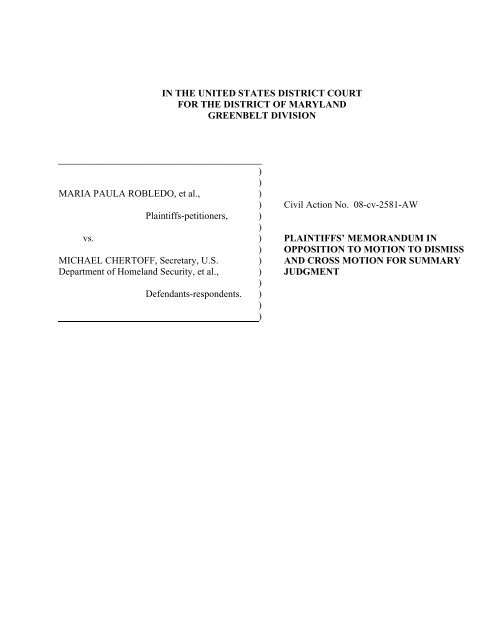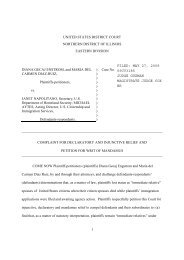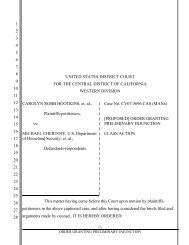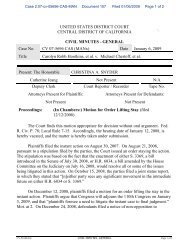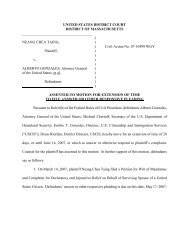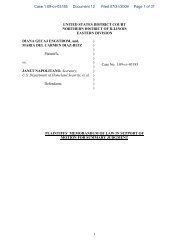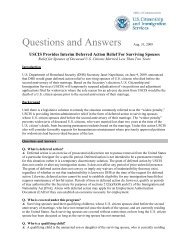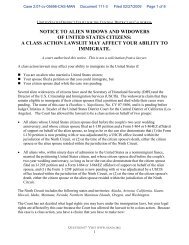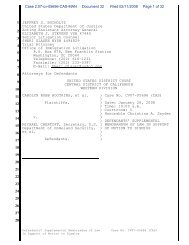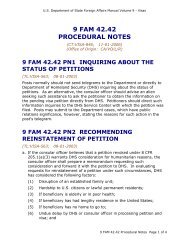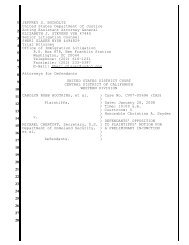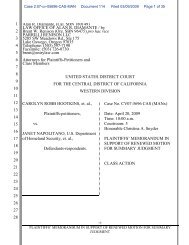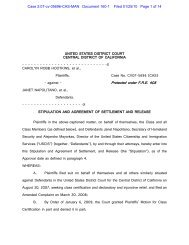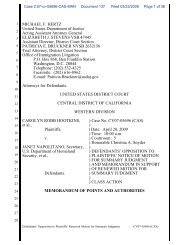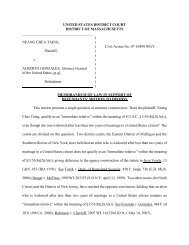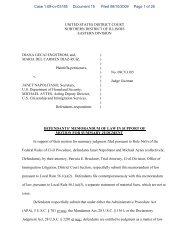Robledo Response to Motion to Dismiss - Surviving Spouses ...
Robledo Response to Motion to Dismiss - Surviving Spouses ...
Robledo Response to Motion to Dismiss - Surviving Spouses ...
You also want an ePaper? Increase the reach of your titles
YUMPU automatically turns print PDFs into web optimized ePapers that Google loves.
IN THE UNITED STATES DISTRICT COURT<br />
FOR THE DISTRICT OF MARYLAND<br />
GREENBELT DIVISION<br />
__________________________________________<br />
)<br />
)<br />
MARIA PAULA ROBLEDO, et al.,<br />
)<br />
)<br />
Plaintiffs-petitioners, )<br />
)<br />
vs.<br />
)<br />
)<br />
MICHAEL CHERTOFF, Secretary, U.S. )<br />
Department of Homeland Security, et al., )<br />
)<br />
Defendants-respondents. )<br />
)<br />
)<br />
Civil Action No. 08-cv-2581-AW<br />
PLAINTIFFS’ MEMORANDUM IN<br />
OPPOSITION TO MOTION TO DISMISS<br />
AND CROSS MOTION FOR SUMMARY<br />
JUDGMENT
TABLE OF CONTENTS<br />
I. THE COURT HAS JURISDICTION ..................................................................................1<br />
A. This Court has Jurisdiction over Plaintiffs’ Claims Notwithstanding the Existence<br />
of Removal Proceedings ..........................................................................................2<br />
B. Exhaustion Is Not Required.....................................................................................5<br />
C. The IIRIA and REAL ID Act’s Jurisdictional Stripping Provisions Are Not<br />
Applicable <strong>to</strong> Plaintiffs’ Claims...............................................................................7<br />
D. The Exercise of Jurisdiction is Consistent with Congressional Intent...................16<br />
E. This Court Has Jurisdiction under The Mandamus Act.........................................18<br />
II.<br />
THE STATUTE IS CLEAR AND UNAMBIGUOUS IN THAT PLAINTIFFS REMAIN<br />
SPOUSES FOR PURPOSES OF IMMEDIATE RELATIVE CLASSIFICATION AND<br />
ADJUSTMENT OF STATUS ...........................................................................................19<br />
A. Statu<strong>to</strong>ry Scheme, Definitions of “Immediate Relative” and “Spouse”................19<br />
B. The Ordinary Meaning of the Term “Spouse” Includes a <strong>Surviving</strong> Spouse........25<br />
C. Subsequent Legislation Is Not Dispositive............................................................30<br />
D. Chevron Deference Is Not Appropriate When The Statute Is Unambiguous Or<br />
When An Agency’s Interpretation Is Impermissible Because It Is Based On A<br />
Discredited Agency Opinion..................................................................................33<br />
III.<br />
IV.<br />
PLAINTIFF HASSAN’S STATUS IS IN DISPUTE........................................................38<br />
CONCLUSION..................................................................................................................39<br />
- i -
TABLE OF AUTHORITIES<br />
CASES<br />
Page(s)<br />
Allison Engine Co. v. United States ex rel. Sanders,<br />
128 S. Ct. 2123 (2008).............................................................................................................12<br />
Anderson v. XYZ Correctional Health Servs, Inc.,<br />
407 F.3d 674 (4th Cir. 2005) ...................................................................................................10<br />
Asare v. Ferro,<br />
999 F. Supp. 657 (D. Md. 1998)..............................................................................................18<br />
Bin Lateef v. Jaromin,<br />
2008 WL 3411783 (E.D. Mo. Aug. 8, 2008).............................................................................8<br />
Bowen v. City of New York,<br />
476 U.S. 467 (1986)...................................................................................................................5<br />
Bowrin v. INS,<br />
194 F.3d 483 (4th Cir. 1999) .....................................................................................................2<br />
Burger v. McElroy,<br />
No. 97 Civ. 8775 (RPP), 1999 U.S. Dist. LEXIS 4854 (S.D.N.Y. Apr. 12, 1999) ...........23, 24<br />
Burni v. Frazier,<br />
Civ. No. 06-5046, 2008 U.S. Dist. LEXIS 91388 (D.Minn. Feb. 14, 2008) ...........................11<br />
Chevron USA Inc. v. Nat’l Resources Def. Council,<br />
467 U.S. 837 (1984)......................................................................................................... passim<br />
Christenson v. Harris County,<br />
529 U.S. 576 (2000).................................................................................................................35<br />
Darby v. Cisneros,<br />
509 U.S. 137 (1993)...................................................................................................................6<br />
El-Khader v. Monica,<br />
366 F.3d 562 (7th Cir. 2004) .....................................................................................................8<br />
- ii -
Freeman v. Gonzales,<br />
444 F.3d 1031 (9th Cir. 2006) ......................................................................................... passim<br />
Garcia-Quintero v. Gonzales,<br />
455 F.3d 1006 (9th Cir. 2006) .................................................................................................35<br />
Gen. Dynamics Land Sys., Inc. v. Cline,<br />
540 U.S. 581 (2004).................................................................................................................32<br />
Gittens v. Menifee,<br />
428 F.3d 382 (2d Cir. 2005).......................................................................................................9<br />
Goumilevski v. Cher<strong>to</strong>ff,<br />
Civ. Act. No. DKC 2006-3247, 2007 U.S. Dist. LEXIS 59858 (D. Md. July 27, 2007) ............<br />
..................................................................................................................................7, 14, 16, 18<br />
Hernandez v. Gonzales,<br />
424 F.3d 42 (1st Cir. 2005)........................................................................................................9<br />
Higuit v. Gonzales,<br />
433 F.3d 417 (4th Cir. 2006) .............................................................................................13, 14<br />
Holy Virgin Protection Cathedral of the Russian Orthodox Church Outside Russia v. Cher<strong>to</strong>ff,<br />
499 F.3d 658 (7th Cir. 2007) .....................................................................................................8<br />
Howell v. INS,<br />
72 F.3d 288 (2d Cir. 1995).........................................................................................................4<br />
Igwebuike v. Caterisano,<br />
230 Fed. Appx. 278 (4th Cir. 2007).........................................................................4, 12, 13, 14<br />
In re Atamian,<br />
247 Fed. Appx. 373 (3d Cir. 2007)..........................................................................................30<br />
In re Garfinkels, Inc.,<br />
203 B.R. 814 (Bankr. D.D.C. 1996) ........................................................................................30<br />
INS v. Aguirre-Aguirre,<br />
526 U.S. 415 (1999).................................................................................................................35<br />
INS v. St. Cyr,<br />
533 U.S. 289 (2001)...................................................................................................................9<br />
Jean v. Gonzales,<br />
435 F.3d 475 (4th Cir. 2006) .........................................................................................8, 13, 14
Kellici v. Gonzales,<br />
472 F.3d 416 (6th Cir. 2006) .....................................................................................................8<br />
Khorrami v. Rolince,<br />
493 F. Supp. 2d 1061 (N.D. Ill. 2007) .......................................................................................9<br />
Kim v. Gonzales,<br />
Civ. No. CCB-05-485, 2006 WL 1892426 (D. Md. June 19, 2006) .................................14, 15<br />
Kim v. Gonzales,<br />
No. Civ. CCB-05-485, 2006 WL 581259 (D. Md. Mar. 7, 2006) .................................9, 14, 15<br />
Lee v. USCIS,<br />
2008 WL 1805749 .............................................................................................................14, 15<br />
Lockhart v. Cher<strong>to</strong>ff,<br />
2008 U.S. Dist. LEXIS 889 (D. Ohio Jan. 7, 2008) ........................................................ passim<br />
Madu v. At<strong>to</strong>rney Gen.,<br />
470 F.3d 1362 (11th Cir. 2006) .................................................................................................8<br />
Martin v. OSHRC,<br />
499 U.S. 144 (1991).................................................................................................................35<br />
McKart v. United States,<br />
395 U.S. 185 (1969)...................................................................................................................5<br />
Mobile Commc’ns Corp. v. FCC,<br />
77 F.3d 1399 (D.C. Cir. 1996).................................................................................................30<br />
Nadarajah v. Gonzales,<br />
443 F.3d 1069 (9th Cir. 2006) ...................................................................................................9<br />
Nnadika v. At<strong>to</strong>rney Gen.,<br />
484 F.3d 626 (3d Cir. 2007).......................................................................................................8<br />
Obioha v. Gonzales,<br />
431 F.3d 400 (4th Cir. 2005) ........................................................................................... passim<br />
Ogbolumani v. United States Citizenship & Immigration Servs.,<br />
523 F. Supp. 2d 864 (N.D. Ill. 2007) ...........................................................................3, 7, 8, 11<br />
Patel v. Cher<strong>to</strong>ff,<br />
No. Civ. A. PJM-05-1304, 2006 WL 5908351 (D. Md. Aug. 31, 2006)...........................14, 15
Perez-Vargas v. Gonzales,<br />
478 F.3d 191 (4th Cir. 2007) .....................................................................................................4<br />
Pierno v. INS,<br />
397 F.2d 949 (2d Cir. 1968)...............................................................................................37, 38<br />
Pinho v. Gonzales,<br />
432 F.3d 193 (3d Cir. 2005)...................................................................................................1, 6<br />
Pitts<strong>to</strong>n Coal Group v. Sebben,<br />
488 U.S. 105 (1988).................................................................................................................18<br />
Port Authority of New York and New Jersey v. Department of Transportation.,<br />
479 F.3d 21 (D.C. Cir. 2008)...................................................................................................36<br />
Reno v. American-Arab Anti-Discrimination Comm.,<br />
525 U.S. 471 (1999)...................................................................................................................2<br />
Robinson v. Cher<strong>to</strong>ff,<br />
No. Civ. A. 06-5702 (SRC), 2007 WL 1412284 (D.N.J. May 14, 2007)................1, 23, 24, 25<br />
Rosell v. State Industrial Accident Commission,<br />
95 P.2d 726 (Or. 1939) ............................................................................................................26<br />
Rosenruist-Gestao E Servicos LDA v. Virgin Enters Ltd.,<br />
511 F.3d 437 (4th Cir. 2007) ...................................................................................................35<br />
Rotimi v. Gonzales,<br />
473 F.3d 55 (2d Cir. 2007).......................................................................................................35<br />
Saintha v. Mukasey,<br />
516 F.3d 243 (4th Cir.) cert. denied, 129 S. Ct. 595 (2008) ....................................................33<br />
Singh v. Ashcroft,<br />
383 F.3d 144 (3d Cir. 2004)...............................................................................................35, 36<br />
Solid Waste Mgmt. Agency of N. Cook County v. United States Army Corps of Eng’rs,<br />
531 U.S. 159 (2001).................................................................................................................30<br />
Stellas v. Esperdy,<br />
388 U.S. 462, 87 S.Ct. 2121, 18 L.Ed. 2d 1322 (1967) ....................................................37, 38<br />
Stewart v. INS,<br />
181 F.3d 587 (4th Cir. 1999) ...................................................................................................10
Taing v. Cher<strong>to</strong>ff,<br />
526 F. Supp. 2d 177 (D. Mass. 2007) .............................................................................. passim<br />
TRW, Inc. v. Andrews,<br />
534 U.S. 19 (2001).............................................................................................................28, 29<br />
Turek v. Dep’t of Homeland Sec.,<br />
450 F. Supp. 2d 736 (E.D. Mich. 2006).............................................................................23, 24<br />
United States v. Fraley,<br />
538 F.2d 626 (4th Cir. 1976) ...................................................................................................32<br />
United States v. Oregon,<br />
366 U.S. 643 (1961).................................................................................................................32<br />
Velasquez-Gabriel v. Crocetti,<br />
263 F.3d 102 (4th Cir. 2001) .............................................................................................13, 14<br />
Volvo GM Heavy Truck Corp. v. U.S. Dep’t of Labor,<br />
118 F.3d 205 (4th Cir. 1997) .................................................................................................5, 6<br />
William v. Gonzales,<br />
499 F.3d 329 (4th Cir. 2007) ...................................................................................................29<br />
Wong v. INS,<br />
373 F.3d 952 (9th Cir. 2004) ...................................................................................................11<br />
AGENCY PROCEEDINGS<br />
Matter of Sano,<br />
19 I. & N. Dec. 299 (B.I.A. 1985) ...................................................................................3, 5, 17<br />
Matter of Sano,<br />
19 I. & N. Dec. 299 (BIA 1985) ..............................................................................................35<br />
Matter of Varela,<br />
13 I&N Dec. 453 (BIA 1970) ...................................................................................... 17, 34-36<br />
STATUTES<br />
8 U.S.C. § 1101(a)(35)...................................................................................................................21
8 U.S.C. § 1151........................................................................................................................10, 15<br />
8 U.S.C. § 1151(b)(2)(A)(i) ................................................................................................... passim<br />
8 U.S.C. § 1151(b)(2)(A)(ii)..........................................................................................................30<br />
8 U.S.C. § 1154..........................................................................................................................3, 38<br />
8 U.S.C. § 1154(a)(1)(A) ...................................................................................................21, 28, 32<br />
8 U.S.C. § 1154(a)(1)(A)(i) ...............................................................................................20, 21, 24<br />
8 U.S.C. § 1154(a)(1)(A)(ii) ..............................................................................................21, 22, 29<br />
8 U.S.C. § 1154(b) .....................................................................................................................3, 24<br />
8 U.S.C. § 1155..................................................................................................................36, 37, 38<br />
8 U.S.C. § 1229(a)(b)(5)(C)...........................................................................................................39<br />
8 U.S.C. § 1251(c) .........................................................................................................................19<br />
8 U.S.C. § 1252(a)(2).......................................................................................................................7<br />
8 U.S.C. § 1252(a)(2)(B) ....................................................................................................... passim<br />
8 U.S.C. § 1252(g) ...........................................................................................................................2<br />
8 U.S.C. § 1255............................................................................................................10, 12, 15, 16<br />
8 U.S.C. § 1554(b) ...................................................................................................................24, 25<br />
28 U.S.C. § 1361............................................................................................................................18<br />
I.R.C. § 6013(a)(3).........................................................................................................................27<br />
I.R.C. § 7448..................................................................................................................................27<br />
Illegal Immigration Reform and Immigrant Responsibility Act of 1996, Pub. L. No. 104-208,<br />
110 Stat. 3009-546 (1996) ............................................................................................... passim<br />
Md. Code Fam. Law Ann., § 2-201 .........................................................................................27, 28<br />
National Defense Authorization Act for Fiscal Year 2004, Pub. L. 108-136,<br />
117 Stat. 1693 ....................................................................................................................30, 31<br />
REAL ID Act of 2005, Pub. L. No. 109-13, 119 Stat. 231........................................................2, 18
USA Patriot Act of 2001, Pub. L. No. 107-56,<br />
115 Stat. 272, 356 §§ 421(a), (b)(1)(B)(i) (2001)..............................................................30, 31<br />
LEGISLATIVE MATERIALS<br />
H.R. 6034.......................................................................................................................................30<br />
H.R. 6938.......................................................................................................................................30<br />
S. 3369 ...........................................................................................................................................30<br />
S. 3514 ...........................................................................................................................................30<br />
REGULATIONS<br />
8 C.F.R. § 103.2(b)(12)..................................................................................................................24<br />
8 C.F.R. § 103.3(a)(ii)......................................................................................................................6<br />
8 C.F.R.§ 204.1(a)(1) .............................................................................................................. 21-22<br />
8 C.F.R.§ 204.2(a).................................................................................................................... 21-22<br />
8 C.F.R. § 206.1(b) ........................................................................................................................36<br />
8 C.F.R. § 245.2(a)(5)(ii)......................................................................................................... 3, 5-7<br />
8 C.F.R. § 1003.1(g) ......................................................................................................................17<br />
8 C.F.R. § 1003.23(b)(4)(ii)...........................................................................................................39<br />
8 C.F.R. § 1245.2(a)(1)................................................................................................................ 2-3<br />
BOOKS AND ARTICLES<br />
Black’s Law Dictionary (4th ed. 1951)..........................................................................................26<br />
Black’s Law Dictionary (6th ed. 1990).................................................................................... 26-27<br />
Black’s Law Dictionary (8th ed. 2004).................................................................................... 25-26
OTHER AUTHORITIES<br />
Charlotte Hall Veteran’s Home, Executive Order 01.01.2004.61(A)(2).......................................28
I. THE COURT HAS JURISDICTION<br />
Across the nation, courts have ruled that federal district courts have jurisdiction <strong>to</strong><br />
consider challenges <strong>to</strong> the “widow’s penalty.” 1 Robinson v. Cher<strong>to</strong>ff, No. Civ. A. 06-5702<br />
(SRC), 2007 WL 1412284, at *1 (D.N.J. May 14, 2007) (district court had jurisdiction under 28<br />
U.S.C. § 1331 and the Administrative Procedure Act (“APA”)), appeal docketed, No. 07-2977<br />
(3d Cir. July 5, 2007); Taing v. Cher<strong>to</strong>ff, 526 F. Supp. 2d 177 (D. Mass. 2007) (district court had<br />
jurisdiction under 28 U.S.C. § 1331, the APA, the Mandamus Act, and the Declara<strong>to</strong>ry<br />
Judgments Act), appeal docketed, No. 08-1179 (1st Cir. Feb. 11, 2008); Lockhart v. Cher<strong>to</strong>ff,<br />
Case No. 1:07CV823, 2008 U.S. Dist. LEXIS 889, at *18 (N.D. Ohio Jan. 7, 2008) (district court<br />
has “jurisdiction <strong>to</strong> determine, as a matter of law, the meaning of ‘spouse’ and ‘immediate<br />
relative’ status”), appeal docketed, No. 08-1179 (6th Cir. 2008). Cf. Pinho v. Gonzales, 432 F.3d<br />
193 (3d Cir. 2005) (district court had jurisdiction under APA over challenge <strong>to</strong> non-discretionary<br />
determination on statu<strong>to</strong>ry eligibility for adjustment of status). Notwithstanding, this<br />
overwhelming precedent, Defendants seek <strong>to</strong> have this case dismissed on jurisdictional grounds.<br />
According <strong>to</strong> Defendants, since United States Citizenship and Immigration Services<br />
(“USCIS”) has commenced removal proceedings against the Plaintiffs, the immigration judge<br />
(“IJ”) has exclusive jurisdiction over Plaintiffs’ claims. Defendants further contend that the<br />
Illegal Immigration Reform and Immigrant Responsibility Act of 1996, Pub. L. No. 104-208,<br />
1 Throughout this brief, Petitioners will refer <strong>to</strong> widows, spouses, surviving spouses, and<br />
husbands, generally, but include by reference step-child and surviving step-child in recognition<br />
of the minor Petitioner, Mateo Pinzon.
110 Stat. 3009-546 (1996) (“IIRIRA”), and the REAL ID Act of 2005, Pub. L. No. 109-13, 119<br />
Stat. 231, strip this court of jurisdiction <strong>to</strong> hear Plaintiffs’ claims and require instead that<br />
Plaintiffs seek relief first from the IJ, then from the Board of Immigration Appeals (“BIA”), and<br />
then in the court of appeals. These arguments are fundamentally flawed and should be rejected.<br />
A. This Court has Jurisdiction over Plaintiffs’ Claims Notwithstanding the<br />
Existence of Removal Proceedings<br />
Defendants argue that, since Plaintiffs are currently in removal proceedings, the IJ has<br />
exclusive jurisdiction over Plaintiffs’ claims until those proceedings are concluded. Defendants<br />
rely on 8 U.S.C. § 1252(g) (2008) and 8 C.F.R. § 1245.2(a)(1) (2008). Neither the statute nor the<br />
regulation divests this Court of jurisdiction.<br />
Although Defendants quote § 1252(g) in its entirety, they fail <strong>to</strong> provide any explanation<br />
as <strong>to</strong> how it precludes this Court’s jurisdiction. In fact, § 1252(g) is no bar <strong>to</strong> this Court’s<br />
jurisdiction over Plaintiffs’ claims. As the Supreme Court explained, § 1252(g) is not some “sort<br />
of ‘zipper’ clause that says ‘no judicial review in deportation cases’ unless this section provides<br />
juridical review.’” Reno v. American-Arab Anti-Discrimination Comm., 525 U.S. 471, 482<br />
(1999). Rather, § 1252(g) is a narrow provision that “applies only <strong>to</strong> three discrete actions that<br />
the At<strong>to</strong>rney General may take: [his] ‘decision or action’ <strong>to</strong> ‘commence proceedings, adjudicate<br />
cases, or execute removal orders.” 525 U.S. at 482. A challenge <strong>to</strong> the unlawful interpretation of<br />
a statute simply is not one of the three discrete actions listed in the statute. Bowrin v. INS, 194<br />
F.3d 483, 488 (4th Cir. 1999). Accordingly, § 1252(g) does not preclude this Court from<br />
exercising jurisdiction here.<br />
- 2 -
Defendants’ contention that 8 C.F.R. § 1245.2(a)(1) vests exclusive jurisdiction in the IJ<br />
<strong>to</strong> adjudicate adjustment of status once removal proceedings have commenced is a red herring.<br />
Plaintiffs are not challenging the adjudication of their I-485 applications for adjustment of status;<br />
rather, Plaintiffs challenge the Defendants’ unlawful interpretation of “immediate relative”<br />
which resulted in the au<strong>to</strong>matic denial of their I-130 petitions. As reflected in Defendants’ brief,<br />
the denial of Plaintiffs’ I-130 petitions is a separate and independent event from the denial of the<br />
I-485 application for adjustment of status. Defendants’ <strong>Motion</strong> <strong>to</strong> <strong>Dismiss</strong>, or Alternatively, for<br />
Summary Judgment at 10-11 (“MTD”).<br />
Significantly, the denial of an I-130 petition is a non-discretionary decision 2 over which<br />
the Executive Office of Immigration Review (“EOIR”), i.e., the IJ and BIA, has no jurisdiction.<br />
See Matter of Sano, 19 I. & N. Dec. 299, 301 (B.I.A. 1985); Lockhart v. Cher<strong>to</strong>ff, 2008 U.S.<br />
Dist. LEXIS 889, at *16 (D. Ohio Jan. 7, 2008); Taing, 526 F. Supp. 2d at 180-81. It is<br />
axiomatic that the IJ can not exercise exclusive jurisdiction over an issue over which the IJ has<br />
no jurisdiction.<br />
Moreover, the regulation vests the IJ with the jurisdiction <strong>to</strong> “consider” applications for<br />
adjustment of status in the removal proceedings. 8 C.F.R. § 245.2(a)(5)(ii) (2008). Since, as<br />
2 Absent evidence that the marriage was a sham, the district direc<strong>to</strong>r must approve a<br />
properly filed I-130 petition. See 8 U.S.C. § 1154(b) (2000) (“[T]he At<strong>to</strong>rney General shall, if<br />
he determines that the facts stated in the petition are true and that the alien in behalf of whom the<br />
petition is made is an immediate relatives specified in § 1151(b) of this title . . . approve the<br />
petition . . .”); Ogbolumani v. United States Citizenship & Immigration Servs., 523 F. Supp. 2d<br />
864, 874-75 (N.D. Ill. 2007) (decisions on petitions for “immediate relative” classification under<br />
8 U.S.C. § 1154 are non-discretionary).<br />
- 3 -
Defendants correctly observe, Plaintiffs’ adjustment of status application is dependent on their<br />
“immediate relative” classification, Plaintiffs are not eligible for, and can not seek adjustment of<br />
status in removal proceedings. Accordingly, there is nothing for the IJ <strong>to</strong> “consider.” See<br />
Igwebuike v. Caterisano, 230 Fed. Appx. 278, 282 (4th Cir. 2007) (distinguishing for purposes of<br />
jurisdiction between review of exercise of discretion whether <strong>to</strong> adjust Igwebuike’s status and<br />
review of “whether Igwebuike is legally eligible <strong>to</strong> be considered for [such] discretionary<br />
relief”).<br />
Defendants cite Perez-Vargas v. Gonzales, 478 F.3d 191 (4th Cir. 2007) and Howell v.<br />
INS, 72 F.3d 288 (2d Cir. 1995), for the proposition that once removal proceedings have<br />
commenced the IJ has exclusive jurisdiction. However, both cases are clearly distinguishable<br />
from the facts and issues here and neither case supports the conclusion that the IJ has exclusive<br />
jurisdiction over Plaintiffs’ claims. In each case, the appellate court ruled that the IJ and the BIA<br />
had jurisdiction over the district direc<strong>to</strong>r’s determination and could grant petitioner’s relief. 3<br />
3 At issue in Perez-Vargas was whether the IJ had jurisdiction <strong>to</strong> review the continuing<br />
validity of a visa petition in a deportation proceeding. Both the IJ and the BIA had concluded<br />
that the IJ lacked such jurisdiction and the alien petitioner appealed <strong>to</strong> the Fourth Circuit Court of<br />
Appeals. The Fourth Circuit ruled that the IJ has jurisdiction <strong>to</strong> make determinations regarding<br />
the continuing validity of the visa petition. Neither visa petitions nor the IJ’s jurisdiction is at<br />
issue here.<br />
In Howell, the alien plaintiff entered the United States on August 8, 1992 on a passport<br />
other than her own. Following her arrival, Howell married a U.S. citizen who then filed a Form<br />
I-130 on her behalf seeking “immediate relative” classification. Howell filed an I-485 petition<br />
seeking adjustment of status and a Form I-601 seeking a waiver of excludability for her<br />
fraudulent entrance <strong>to</strong> the United States. The District Direc<strong>to</strong>r granted Howell’s I-130 petition,<br />
but denied the I-485 adjustment of status application based on Howell’s failure <strong>to</strong> prove that she<br />
was in fact the person who presented the fraudulent passport and was inspected on August 8,<br />
{cont’d}<br />
- 4 -
Accordingly, in each case the appellate court ruled that the petitioner was required <strong>to</strong> exhaust<br />
administrative remedies. Here, the IJ and BIA have no authority <strong>to</strong> reverse the District<br />
Direc<strong>to</strong>r’s unlawful and non-discretionary denial of Plaintiffs’ I-130 Petitions so there are no<br />
administrative remedies available <strong>to</strong> Plaintiffs <strong>to</strong> exhaust.<br />
B. Exhaustion Is Not Required<br />
It is well settled that administrative exhaustion is not required where, as here, exhaustion<br />
would be futile. See, e.g., Bowen v. City of New York, 476 U.S. 467 (1986); McKart v. United<br />
States, 395 U.S. 185 (1969); Volvo GM Heavy Truck Corp. v. U.S. Dep’t of Labor, 118 F.3d<br />
205 (4th Cir. 1997). The Executive Office of Immigration Review (“EOIR”) has no jurisdiction<br />
over Form I-130 petitions and therefore cannot grant Plaintiffs relief. See Matter of Sano, 19 I.<br />
& N. Dec. 299, 301 (BIA 1985); Lockhart v. Cher<strong>to</strong>ff, 2008 U.S. Dist. LEXIS 889, at *16;<br />
Taing, 526 F. Supp. 2d at 180-81. Furthermore, under 8 C.F.R. § 245.2(a)(5)(ii) (2008),<br />
1992. While deportation proceedings were pending, Howell sought review of the District<br />
Direc<strong>to</strong>r’s denial of adjustment in federal district court in New York. The district court<br />
dismissed the complaint for lack of subject matter jurisdiction. On appeal, the Second Circuit<br />
ruled that the trial court did not have subject matter jurisdiction because Howell had failed <strong>to</strong><br />
exhaust her administrative remedies. Significantly, in Howell, USCIS did not strip petitioner of<br />
her status as “immediate relative.” As a result, she had a meaningful opportunity <strong>to</strong> seek relief<br />
from the denial of her application for adjustment of status in the deportation proceedings. The<br />
fact that the deportation proceedings provided Howell with an opportunity <strong>to</strong> apply and receive<br />
de novo review of her application for adjustment and that such review would not be futile were<br />
key fac<strong>to</strong>rs in the court’s ruling that Howell must exhaust her administrative remedies. Id. at<br />
293. Unlike Howell, Petitioners in this case have been stripped of their status as “immediate<br />
relatives” and cannot obtain meaningful relief from an IJ or the BIA who lack jurisdiction over I-<br />
130 classifications.<br />
- 5 -
Plaintiffs cannot appeal the denial of their Form I-485 application for adjustment of status.<br />
Although the regulation provides that Plaintiffs may renew their I-485 applications in removal<br />
proceedings, it would be a useless exercise. “Because [Plaintiffs’] Form I-485 application[s]<br />
[are] entirely dependent on an approved Form I-130 petition[s], it would be futile for [them] <strong>to</strong><br />
renew the application in . . . removal proceedings . . ..” Lockhart, 2008 U.S. Dist LEXIS 889, at<br />
*15-16 (citing Taing, 526 F. Supp. 2d at 182-86). In short, Plaintiffs have no administrative<br />
remedies available <strong>to</strong> them, and the denial of their I-130 petitions is for all practical purposes a<br />
“final agency action.” See Pinho, 432 F.3d at 200-01. Plaintiffs have functionally exhausted<br />
their remedies and any effort by Plaintiffs <strong>to</strong> seek administrative relief would be an exercise in<br />
utter futility. This the law does not require. 4<br />
Moreover, pursuant <strong>to</strong> U.S. Supreme Court precedent, federal courts may not require a<br />
Petitioner <strong>to</strong> exhaust administrative remedies before seeking review under the APA unless<br />
exhaustion is expressly required by statute, or by an agency rule. Darby v. Cisneros, 509 U.S.<br />
137, 143-44 (1993); see also Volvo GM Heavy Truck Corp., 118 F.3d at 209 (citing Darby).<br />
Here, no statute or rule mandates exhaustion. 8 C.F.R. § 103.3(a)(ii) provides that “certain<br />
unfavorable decisions on applications, petitions, and other types of cases may be appealed. 8<br />
C.F.R. § 245.2(a)(5)(ii) does not expressly require that an alien renew a denied I-485 application<br />
4 Under Defendants scheme, the Petitioners would have <strong>to</strong> remain in a untenable state of<br />
limbo - unable legally <strong>to</strong> work or even drive a car - as they go through the motions of the<br />
deportation proceedings, notwithstanding the fact that neither the IJ nor the BIA have authority<br />
<strong>to</strong> provide Petitioners any relief from the unlawful denial of their I-130 petitions and therefore<br />
authority <strong>to</strong> afford Petitioners any relief at all.<br />
- 6 -
in removal proceedings. Instead, 8 C.F.R. § 245.2(a)(5)(ii) states that an alien “may renew a<br />
denied application” in removal proceedings. This language is clearly permissive. Accordingly,<br />
Plaintiffs are not required <strong>to</strong> await the inexorable outcome of the removal proceedings before<br />
seeking relief in a federal court.<br />
C. The IIRIA and REAL ID Act’s Jurisdictional Stripping Provisions Are Not<br />
Applicable <strong>to</strong> Plaintiffs’ Claims<br />
Defendants next contend that 8 U.S.C. § 1252(a)(2) requires that this challenge be<br />
brought before the immigration courts in the first instance with appeal directly <strong>to</strong> a court of<br />
appeals. That statute, however, provides for limitations on judicial review of certain<br />
proceedings in the immigration courts enumerated in the statute. None of the jurisdictional<br />
limitations apply <strong>to</strong> Plaintiffs’ claims.<br />
Section 1252(a)(2)(B), which was enacted as part of IIRIRA, Pub. L. No. 104-208, strips<br />
the courts of jurisdiction as <strong>to</strong> decisions and actions by the At<strong>to</strong>rney General or Secretary of<br />
Homeland Security that are expressly enumerated in the statute or are assigned by statute <strong>to</strong> their<br />
discretion. Id.; Goumilevski v. Cher<strong>to</strong>ff, Civ. Act. No. DKC 2006-3247, 2007 U.S. Dist. LEXIS<br />
59858 (D. Md. July 27, 2007); Ogbolumani, 523 F. Supp. 2d at 873. That statute provides as<br />
follows:<br />
(B) Denials of discretionary relief<br />
Notwithstanding any other provision of law (statu<strong>to</strong>ry or nonstatu<strong>to</strong>ry),<br />
including section 2241 of Title 28, or any other habeas corpus provision, and<br />
sections 1361 and 1651 of such title, and except as provided in subparagraph (D),<br />
and regardless of whether the judgment, decision, or action is made in removal<br />
proceedings, no court shall have jurisdiction <strong>to</strong> review—<br />
- 7 -
(i) any judgment regarding the granting of relief under section 1182 (h),<br />
1182 (i), 1229b, 1229c, or 1255 of this title, or<br />
(ii) any other decision or action of the At<strong>to</strong>rney General or the Secretary<br />
of Homeland Security the authority for which is specified under this<br />
subchapter <strong>to</strong> be in the discretion of the At<strong>to</strong>rney General or the Secretary<br />
of Homeland Security, other than the granting of relief under section 1158<br />
(a) of this title.<br />
8 U.S.C. § 1252(a)(2)(B) (Supp. V 2005). Thus, by its express terms, “the jurisdiction-stripping<br />
provisions apply only <strong>to</strong> judgments by the Government specified under § 1252(a)(2)(B)(i) and<br />
other decisions or actions of the Government that are discretionary under § 1252(a)(2)(B)(ii).”<br />
Ogbolumani, 523 F. Supp. 2d at 873 (citing El-Khader v. Monica, 366 F.3d 562 (7th Cir. 2004)<br />
and Holy Virgin Protection Cathedral of the Russian Orthodox Church Outside Russia v.<br />
Cher<strong>to</strong>ff, 499 F.3d 658 (7th Cir. 2007)).<br />
In 2005, Congress enacted the Real ID Act which merely confirmed the prevailing view<br />
in the circuits that, while the IIRIRA foreclosed judicial review of discretionary decisions<br />
themselves, it did not bar review of “constitutional questions or questions of law arising from the<br />
agency’s decision <strong>to</strong> deny discretionary relief.” Jean v. Gonzales, 435 F.3d 475, 480 (4th Cir.<br />
2006) (emphasis added). The REAL ID Act provided direct appeal of such questions <strong>to</strong> the court<br />
of appeals. Neither the IIRIRA nor the REAL ID Act address judicial review of non-enumerated<br />
and non-discretionary decisions.<br />
Several courts have held that § 1252 “only strips a district court of jurisdiction when the<br />
alien is challenging an order of removal.” Bin Lateef v. Jaromin, 2008 WL 3411783, at *3 (E.D.<br />
Mo. Aug. 8, 2008) (citing Nnadika v. At<strong>to</strong>rney Gen., 484 F.3d 626, 632 (3d Cir. 2007); Kellici v.<br />
Gonzales, 472 F.3d 416, 419-20 (6th Cir. 2006); Madu v. At<strong>to</strong>rney Gen., 470 F.3d 1362, 1365-<br />
- 8 -
67 (11th Cir. 2006); Nadarajah v. Gonzales, 443 F.3d 1069, 1075-76 (9th Cir. 2006); Gittens v.<br />
Menifee, 428 F.3d 382, 383 (2d Cir. 2005); Hernandez v. Gonzales, 424 F.3d 42, 43 (1st Cir.<br />
2005)); but see Kim v. Gonzales, No. Civ. CCB-05-485, 2006 WL 581259, at *1 (D. Md. Mar. 7,<br />
2006). 5 Plaintiffs do not challenge here an order of removal and, therefore, § 1252 is<br />
inapplicable.<br />
According <strong>to</strong> the U.S. Supreme Court, “[j]urisdiction stripping provisions must be<br />
interpreted in light of ‘the strong presumption in favor of judicial review of administrative<br />
action.’” Khorrami v. Rolince, 493 F. Supp. 2d 1061, 1066 (N.D. Ill. 2007) (quoting INS v. St.<br />
Cyr, 533 U.S. 289, 298 (2001)); Obioha v. Gonzales, 431 F.3d 400, 405-06 (4th Cir. 2005).<br />
Accordingly, “a showing of clear and convincing evidence of a contrary legislative intent <strong>to</strong><br />
restrict access <strong>to</strong> judicial review . . . of administrative action” is required. Obioha, 431 F.3d at<br />
405 (quotations omitted and citations omitted). Applying these principles of statu<strong>to</strong>ry<br />
construction, the Fourth Circuit has interpreted the § 1252 jurisdictional stripping provisions<br />
narrowly. 431 F.3d at 405.<br />
By its plain language, § 1252(a)(2)(B)’s jurisdiction stripping provisions do not apply <strong>to</strong><br />
Plaintiffs’ action. Section 1252(a)(2)(B)(i) bars judicial review of “any judgment regarding the<br />
5 While Kim construed § 1252(a)(2)(B) as applying <strong>to</strong> agency action outside removal<br />
proceedings, that construction is necessarily limited <strong>to</strong> actions enumerated in § 1252(a)(2)(B).<br />
As discussed below, Petitioners do not challenge an enumerated action.<br />
- 9 -
granting of relief” under the specific enumerated statu<strong>to</strong>ry sections. 6<br />
Significantly, Congress<br />
omitted from this list § 1151, which defines “immediate relative,” and § 1154(1)(a), which<br />
authorizes the filing of a petition for “immediate relative” classification. Under the canon of<br />
statu<strong>to</strong>ry construction expressio unis, exclusio alterius, the statute’s jurisdictional bar does not<br />
apply <strong>to</strong> judicial review of Defendants’ unlawful interpretation of 8 U.S.C. § 1151. See<br />
Anderson v. XYZ Correctional Health Servs, Inc., 407 F.3d 674, 680 (4th Cir. 2005).<br />
Plaintiffs’ challenge implicates neither a “judgment” nor the sections enumerated in §<br />
1252(a)(2)(B)(i). Importantly, Defendants’ subsequent reliance on its unlawful denial of the I-<br />
130 petitions <strong>to</strong> deny the I-485 applications and <strong>to</strong> initiate removal proceedings does not bring<br />
Plaintiffs’ challenge of that prior act within the ambit of § 1252. See Obioha, 431 F.3d at 406<br />
(“[a] reviewing court, therefore, must examine the basis for the BIA’s decision rather than the<br />
end result of the BIA’s decision <strong>to</strong> determine whether the decision is ‘under’ a section . . . that<br />
precludes judicial review.”) (quoting Stewart v. INS, 181 F.3d 587, 595 (4th Cir. 1999)).<br />
Accordingly, § 1252(a)(2)(B)(i) is no bar <strong>to</strong> judicial review by this Court of Plaintiffs’ claims.<br />
Section 1252(a)(2)(B)(ii) bars judicial review only of discretionary decisions and,<br />
similarly, is no bar <strong>to</strong> this Court’s jurisdiction. Specifically, that section provides that the<br />
jurisdictional bar applies <strong>to</strong> any decision or act that is assigned under 8 U.S.C. §§ 1151-1378<br />
6 Those enumerated sections are § 1182(h) and (i), providing authority <strong>to</strong> issue waivers<br />
for convictions for illegal drug possession and for fraud and misrepresentation; § 1229(b)<br />
providing authority <strong>to</strong> cancel removal proceedings for certain groups including battered spouses;<br />
§ 1229(b) providing authority <strong>to</strong> allow voluntary departure in lieu of deportation; and § 1255<br />
providing for adjustment of status <strong>to</strong> permanent residence.<br />
- 10 -
(2000 & Supp. V 2005) <strong>to</strong> the discretion of the At<strong>to</strong>rney General or Secretary of Homeland<br />
Security, with one exception not relevant here. 7<br />
The canons of statu<strong>to</strong>ry construction referenced<br />
above, which require this Court <strong>to</strong> construe the IIRIRA’s jurisdiction stripping provisions<br />
narrowly and <strong>to</strong> exclude from coverage things not specifically mentioned, compel the conclusion<br />
that non-discretionary actions, such as the actions challenged here, are not subject <strong>to</strong> the<br />
jurisdictional stripping provision. See Obioha, 431 F.3d at 405-06; Wong v. INS, 373 F.3d 952,<br />
963 (9th Cir. 2004) (jurisdictional stripping provision should not be “expanded beyond its<br />
precise language” and does not preclude district court jurisdiction over claims that raise<br />
constitutional or purely legal non-discretionary challenges); Burni v. Frazier, Civ. No. 06-5046<br />
(RAM/JSM), 2008 U.S. Dist. LEXIS 91388 (D. Minn. Feb. 14, 2008) (§ 1252(a)(2)(B)(ii) did<br />
not strip district court of jurisdiction over complaint seeking <strong>to</strong> compel the Government <strong>to</strong><br />
process and adjudicate application for adjustment of status since the Government’s duty <strong>to</strong> do so<br />
was non-discretionary; U.S. Magistrate decision adopted in 545 F. Supp. 2d 894 (D. Minn.<br />
2008)); Ogbolumani, 523 F. Supp. 2d at 864 (§ 1252 does not strip district court of jurisdiction <strong>to</strong><br />
consider petitioner’s challenge of the denial of his I-130 petition for classification as “immediate<br />
relative”).<br />
Moreover, the fact that §§ 1151 and 1154 are encompassed in the § 1252(a)(2)(B)(ii) bar<br />
against judicial review of discretionary decisions, but are not listed in § 1252(a)(2)(B)(i)<br />
compels the conclusion that Congress did not intend <strong>to</strong> subject non-discretionary decisions on<br />
1158(a).<br />
7 The exception is for discretionary decisions related <strong>to</strong> requests for asylum under §<br />
- 11 -
“immediate relative” classification <strong>to</strong> the jurisdictional limitations set forth in § 1252(a)(2)(B).<br />
See Allison Engine Co. v. United States ex rel. Sanders, 128 S. Ct. 2123, 2129-130 (2008)<br />
(“[W]hen Congress includes particular language in one section of a statute but omits it in another<br />
section of the same Act, it is generally presumed that Congress acts intentionally and purposely<br />
in the disparate inclusion or exclusion”) (internal quotation marks and citation omitted).<br />
The Fourth Circuit’s recent decision in Igwebuike is instructive. There, petitioner sought<br />
judicial review in this Court of the District Direc<strong>to</strong>r’s determination that he was not legally<br />
eligible for consideration for an adjustment of status. Igwebuike, 230 Fed. Appx. at 281. The<br />
Government argued that this Court lacked jurisdiction because the decision <strong>to</strong> adjust an alien’s<br />
status is committed <strong>to</strong> the discretion of the At<strong>to</strong>rney General under § 1255 and the IIRIRA strips<br />
the courts of jurisdiction over discretionary decisions. 230 Fed. Appx. at 281. This Court<br />
dismissed for lack of subject matter jurisdiction and Igwebuike appealed. The Fourth Circuit<br />
reversed. The appellate court acknowledged that it lacked jurisdiction <strong>to</strong> review a denial of<br />
status of adjustment, but distinguished Igwebuike’s challenge:<br />
Igwebuike, however, does not challenge a discretionary decision<br />
by the Direc<strong>to</strong>r. Indeed, the Direc<strong>to</strong>r did not have the opportunity<br />
<strong>to</strong> exercise discretion because he determined that Igwebuike was<br />
an inadmissible alien under § 1182(a)(2)(C)(i) and therefore<br />
statu<strong>to</strong>rily ineligible for discretionary relief. See § 1255<br />
(permitting the At<strong>to</strong>rney General <strong>to</strong> adjust the status of aliens who<br />
are “admissible <strong>to</strong> the United States”). Igwebuike only seeks<br />
- 12 -
eview of what he contends is legal error in the determination that<br />
rendered him ineligible for an adjustment of status. 8<br />
Id. at 282. The appellate court also ruled that since Igwebuike did not challenge the order of<br />
removal, the REAL ID Act did not apply. Id. at 281.<br />
In this case, as in Igwebuike, Plaintiffs challenge a non-discretionary action that rendered<br />
them ineligible for adjustment of status; namely, Defendants’ action with respect <strong>to</strong> Plaintiffs’<br />
“immediate relative” classification. Supra n.2. Accordingly, § 1252 (a)(2)(B)(ii) does not strip<br />
this Court of jurisdiction <strong>to</strong> consider Plaintiffs’ challenge.<br />
Although the Fourth Circuit has considered § 1252 jurisdictional issues in other cases,<br />
none of those cases have addressed jurisdiction of the district court. See, e.g., Jean, 435 F.3d 475<br />
(considering whether circuit court had jurisdiction over USCIS decisions denying Plaintiffs’<br />
motions seeking relief from removal); Higuit v. Gonzales, 433 F.3d 417, 420 (4th Cir. 2006)<br />
(appellate court lacked jurisdiction <strong>to</strong> consider challenge <strong>to</strong> denial of adjustment of status since<br />
challenge raised no constitutional issues or legal questions), cert. denied, 548 U.S. 906 (2006);<br />
Obioha , 431 F.3d 400 (gatekeeper provisions are no bar <strong>to</strong> appellate court’s review of BIA’s<br />
denial of motion <strong>to</strong> remand <strong>to</strong> IJ in order <strong>to</strong> pursue cancellation of removal since decision was<br />
not on merits under a section enumerated in § 1252); Velasquez-Gabriel v. Crocetti, 263 F.3d<br />
102, 104 n.1 (4th Cir. 2001) (holding that appellate court lacked jurisdiction <strong>to</strong> review order<br />
8 Although Igwebuike was decided under the IIRIRA transitional rules governing judicial<br />
review, which are not identical <strong>to</strong> the permanent rules, the reasoning continues <strong>to</strong> apply. See<br />
Obioha, 431 F.3d at 406.<br />
- 13 -
denying status adjustment). Further Higuit, Velasquez-Gabriel and Jean each involved a<br />
challenge <strong>to</strong> a denial of status of adjustment and therefore are not applicable here.<br />
While Jean does not address district court jurisdiction specifically, the court outlined the<br />
scope of the jurisdictional stripping provisions. The appellate court observed that §<br />
1252(a)(2)(B) “appears, by its terms, <strong>to</strong> create an unqualified bar <strong>to</strong> judicial review of decisions<br />
involving the specified types of discretionary relief . . ..” 435 F.3d at 480. The court also<br />
observed that the REAL ID Act confirmed that direct review by appellate courts was available<br />
for constitutional questions or questions of law arising from the agency’s decision <strong>to</strong> deny<br />
discretionary relief.” Id. Both of these observations support the conclusion that § 1252 does not<br />
strip any court of jurisdiction with respect <strong>to</strong> non-discretionary acts under sections not expressly<br />
enumerated in § 1252(a)(2)(B).<br />
Recently, this Court addressed its jurisdiction under § 1252 in five unreported decisions. 9<br />
Lee v. USCIS, No. Civ. A. CCB-07-141, 2008 WL 1805749 (D. Md. April 8, 2008);<br />
Goumilevski v. Cher<strong>to</strong>ff, Civ. Act. No. DKC 2006-3247, 2007 U.S. Dist. LEXIS 59858 (D. Md.<br />
July 27, 2007); Patel v. Cher<strong>to</strong>ff, No. Civ. A. PJM-05-1304, 2006 WL 5908351 (D. Md. Aug.<br />
31, 2006); Kim v. Gonzales, Civ. No. CCB-05-485, 2006 WL 1892426 (D. Md. June 19, 2006)<br />
(adopting provisional conclusions on jurisdiction set forth in 2006 WL 581259 ( March 7, 2006);<br />
Igwebuike v. Caterisano, No. Civ. A. DKC-04-1586, 2005 WL 745577 (D. Md. Mar. 18, 2005),<br />
9 As Judge Blake recently recognized, “unpublished opinions are neither precedential nor<br />
otherwise binding.” Lee v. USCIS, 2008 WL 1805749, at *3 n. 1.<br />
- 14 -
ev’d, 230 Fed. Appx. 278 (4th Cir. 2007). Each of these cases is readily distinguishable from<br />
the case at bar and none addressed the precise issue presented here, a challenge <strong>to</strong> the widow<br />
penalty.<br />
Lee and Patel each involved claims that a USCIS regulation violated the language and<br />
intent of 8 U.S.C. § 1255. See Lee v. USCIS, at *3 n.1. Since § 1255 is an enumerated<br />
provision under § 1252(a)(B)(2)(i), the court held that the plaintiffs’ claims were subject <strong>to</strong> the<br />
IIRIRA and the REAL ID Act’s jurisdictional scheme which required that plaintiffs first<br />
challenge the USCIS interpretation in removal proceedings and then appeal directly <strong>to</strong> the Court<br />
of Appeals. Here, Plaintiffs challenge the widow penalty on the grounds that it violates § 1151,<br />
which is not an enumerated provision in the IIRIRA and, therefore, is not subject there<strong>to</strong>.<br />
Similarly, Kim involved a challenge <strong>to</strong> denial of an application for adjustment of status.<br />
This Court concluded that the Kims were seeking de novo review of an agency decision on the<br />
merits of its application for adjustment of status under § 1255. Kim, 2006 WL 581259, at *4.<br />
Since § 1255 is an enumerated provision in § 1252(a)(2)(B)(i), the Court concluded that it lacked<br />
subject matter jurisdiction. Kim, 2006 WL 1892426, at *1. Significantly, the Court<br />
distinguished the Fourth Circuit’s decision in Obioha on the grounds that, in Obioha, “the agency<br />
decision under review was not a decision on the merits under a section enumerated by the<br />
gatekeeper provision.” Kim, 2006 WL 581259, at *3.<br />
As in Obioha, Plaintiffs here do not<br />
challenge a decision on the merits of their applications for adjustment of status. Rather,<br />
Plaintiffs challenge a non-discretionary action by the USCIS prior <strong>to</strong> and independent of any<br />
action by the agency on Plaintiffs’ I-485 petitions.<br />
- 15 -
In Goumilevski, the petitioner sought an order <strong>to</strong> compel USCIS <strong>to</strong> process his I-485<br />
application for adjustment of status under § 1255. This Court held that the pace at which USCIS<br />
processed I-485 applications was discretionary. The court, relying on § 1252(a)(B)(2)(ii), which<br />
strips the courts of jurisdiction over discretionary decisions with respect <strong>to</strong> § 1255, ruled that<br />
Goumilevski’s claim was not subject <strong>to</strong> judicial review. Unlike in Goumilevski, here, Plaintiffs<br />
challenge a non-discretionary determination – the unlawful denial of Plaintiffs’ I-130 petitions<br />
for classification as “immediate relatives.” Accordingly, jurisdiction in this Court is proper.<br />
D. The Exercise of Jurisdiction is Consistent with Congressional Intent<br />
Lastly, Defendants contend that the exercise of jurisdiction by this Court would frustrate<br />
Congressional intent. MTD at 18. Specifically, Defendants contend that Congress intended <strong>to</strong><br />
allow the immigration bodies with expertise <strong>to</strong> have the opportunity <strong>to</strong> decide controlling<br />
questions of immigration in the first instance and <strong>to</strong> give the courts of appeals direct jurisdiction<br />
from the BIA’s decision. Defendants further contend that this would allow the BIA <strong>to</strong> create a<br />
sufficient record for review and avoid a patchwork application of immigration laws under which<br />
similarly situated immigrants will be treated differently depending on the forum in which they<br />
reside. Id. There are several flaws in Defendants’ argument.<br />
As discussed above, the immigration bodies with expertise, i.e., the IJ and the BIA have<br />
no jurisdiction <strong>to</strong> decide whether the widow penalty is lawful. Further, since the IJ and BIA<br />
have no jurisdiction, they cannot create the record for appellate review; it is up <strong>to</strong> this Court <strong>to</strong><br />
fill that role. Thus, no conflict exists between the exercise of jurisdiction by this Court and<br />
Congressional intent.<br />
- 16 -
As <strong>to</strong> the patchwork concern, Defendants have already let that horse out of the stable. It<br />
is USCIS official policy <strong>to</strong> treat similarly situated immigrant widows differently depending on<br />
the forum in which they live. In a November 8, 2007 memorandum from Mike Aytes, USCIS<br />
Associate Direc<strong>to</strong>r of Domestic Operations, USCIS revised the Adjudica<strong>to</strong>r’s Field Manual in<br />
light of the Ninth Circuit’s rejection of the widow penalty in Freeman v. Gonzales, 444 F.3d<br />
1031 (9th Cir. 2006) <strong>to</strong> read as follows:<br />
(4) Effect of the petitioner’s death before approval. (A)(1) Except<br />
as provided in paragraph (a)(4)(B) of this chapter for cases<br />
governed by the precedent decisions of the Ninth Circuit, a Form I-<br />
130 must be denied if the visa petitioner dies after the visa<br />
petitioner filed the Form I-130 and before USCIS has adjudicated<br />
the Form I-130. Matter of Sano, 19 I&N Dec. 299 (BIA 1985) and<br />
Matter of Varela, 13 I&N Dec. 453 (BIA 1970). A USCIS<br />
adjudica<strong>to</strong>r will actually deny a Form I-130 in this situation, and<br />
not just “terminate action” on it. The denial will give as reasons<br />
for the denial the reasoning stated in paragraph (a)(4)(A)(2) of this<br />
chapter.<br />
(A)(2) Effect of Freeman v. Gonzales outside the Ninth Circuit.<br />
USCIS adjudica<strong>to</strong>rs shall not follow the decision in Freeman v.<br />
Gonzales, 444 F.3d 1031 (9th Cir. 2006) in any case arising<br />
outside the Ninth Circuit. The USCIS position is that Freeman was<br />
wrongly decided, for the reasons set forth in this chapter<br />
21.2(a)(4)(A)(2). USCIS adjudica<strong>to</strong>rs, moreover, are legally<br />
obligated <strong>to</strong> follow Sano and Varela, since the Board designated<br />
them as precedents. 8 C.F.R. § 1003.1(g).<br />
Memorandum from Mike Aytes, at 3 (Nov. 8, 2007). Thus, widows residing within the Ninth<br />
Circuit are not subject <strong>to</strong> the widow penalty. Widows residing outside the Ninth Circuit,<br />
including Plaintiffs, are subject <strong>to</strong> the widow penalty. Presumably, Defendants intend <strong>to</strong> apply a<br />
similar policy in each jurisdiction in which the widow penalty has been or will be ruled unlawful.<br />
- 17 -
E. This Court Has Jurisdiction under The Mandamus Act<br />
Regardless of whether the IIRIRA and the REAL ID Act of 2005 applies <strong>to</strong> Plaintiffs’<br />
claims - they do not - this Court has subject matter jurisdiction pursuant <strong>to</strong> 28 U.S.C. § 1361<br />
(2000), the Mandamus Act. That statute grants district courts “original jurisdiction in any action<br />
in the nature of mandamus <strong>to</strong> compel an officer or employee of the United States or any agency<br />
thereof <strong>to</strong> perform a duty owed <strong>to</strong> the plaintiff.” Id. “The extraordinary remedy of mandamus<br />
under 28 U.S.C. § 1361 will issue only <strong>to</strong> compel the performance of a clear nondiscretionary<br />
duty.” Goumilevski, 2007 U.S. Dist. LEXIS 59858, at *11 (quoting Pitts<strong>to</strong>n Coal Group v.<br />
Sebben, 488 U.S. 105, 121 (1988)). In order <strong>to</strong> obtain relief under the Mandamus Act, the<br />
Plaintiffs must show (1) that they have the clear legal right <strong>to</strong> the relief sought, (2) that the<br />
defendants have a clear legal duty <strong>to</strong> do the particular act requested, and (3) that no other<br />
adequate remedy is available. Id. (citing Asare v. Ferro, 999 F. Supp. 657, 659 (D. Md. 1998)).<br />
Plaintiffs satisfy each of the three criteria.<br />
As discussed in section II, Plaintiffs have a clear legal right <strong>to</strong> the relief sought.<br />
Conversely, Defendants have a clear legal duty under the statute <strong>to</strong> classify Plaintiffs as<br />
“immediate relatives.”<br />
No adequate alternative remedy is available. Since neither the IJ nor the BIA have<br />
jurisdiction over Form I-130 classifications, Plaintiffs are foreclosed from pursuing an<br />
administrative challenge. Since § 1252 might be construed as granting a right of direct review<br />
only of a “final order of removal,” unless and until the Government issues such an order,<br />
Plaintiffs lack any avenue of relief other than this Court. Indeed, since the BIA lacks jurisdiction<br />
- 18 -
over the “immediate relative” classification, it is unclear that Plaintiffs would have a basis <strong>to</strong><br />
seek relief in the circuit court of appeals in the context of an appeal from a final order of<br />
removal. In any event, and in the meantime, Plaintiffs are suffering significant and irreparable<br />
harm. They exist in an untenable legal limbo, unable <strong>to</strong> participate legally in society. Denied the<br />
ability <strong>to</strong> work lawfully in this country or even drive a car, their lives are day-<strong>to</strong>-day struggles.<br />
Social Security Survivor benefits and estate benefits are in imminent jeopardy due <strong>to</strong> the lack of<br />
legal status. Plaintiffs are being forced <strong>to</strong> face difficult decisions when mourning the death of a<br />
spouse, including deciding whether <strong>to</strong> leave behind family they have come <strong>to</strong> love, and whether<br />
<strong>to</strong> separate their U.S. citizen children from their deceased spouse’s grandparents and other family<br />
members.<br />
II.<br />
THE STATUTE IS CLEAR AND UNAMBIGUOUS IN THAT PLAINTIFFS<br />
REMAIN SPOUSES FOR PURPOSES OF IMMEDIATE RELATIVE<br />
CLASSIFICATION AND ADJUSTMENT OF STATUS<br />
A. Statu<strong>to</strong>ry Scheme, Definitions of “Immediate Relative” and “Spouse”<br />
Family relationships form an integral part of our nation’s immigration laws; Congress has<br />
given immediate relatives a special place in the statutes. Recognizing that the family unit is the<br />
bedrock of our national community Congress has granted U.S. citizens the right <strong>to</strong> have their<br />
immediate family present in the United States without delay. Immediate relatives are exempt<br />
from numerical limitations imposed on other relatives so that immigrant visas are immediately<br />
available. Immediate relatives also receive protections not granted <strong>to</strong> other categories of<br />
immigrants. 8 U.S.C. § 1151(B)(2) (2000); see also 8 U.S.C. § 1251(c) (exempting “immediate<br />
- 19 -
elative(s)” applying for adjustment of status <strong>to</strong> lawful permanent resident from numerous bars <strong>to</strong><br />
eligibility).<br />
Under 8 U.S.C. §§ 1151(b)(2)(A)(i) and 1154(a)(1)(A)(i) (2000) a U.S. citizen may<br />
petition <strong>to</strong> have the status of an alien who is an “immediate relative” adjusted <strong>to</strong> lawful<br />
permanent resident. The first sentence of § 1151(b)(2)(A)(i) defines who qualifies as an<br />
“immediate relative.”<br />
Immediate relatives - For purposes of this subsection, the term<br />
“immediate relatives” means that the children, spouses, and parents<br />
of a citizen of the United States, except that, in the case of parents,<br />
such citizens shall be at least 21 years of age.<br />
Id. Most significantly, the first sentence of 8 U.S.C. § 1151(b)(2)(A)(i), includes “children,<br />
spouses, and parents” of U.S. citizens. Id. Within this group, only alien parents are subjected <strong>to</strong><br />
any limitation, “with the grant of immediate relative status being restricted <strong>to</strong> those whose citizen<br />
child is at least 21 years of age.” Freeman, 444 F.3d at 1039. The statute places no comparable<br />
limitations on a ‘spouse’, such as a requirement that the marriage must have existed for at least<br />
two years.” Id.<br />
“Spouse,” in turn, is defined at § 1101 as follows:<br />
The term “spouse,” “wife,” or “husband” do not include a spouse, wife, or<br />
husband by reason of any marriage ceremony where the contracting<br />
parties there<strong>to</strong> are not physically present in the presence of each other,<br />
unless the marriage shall have been consummated.<br />
- 20 -
8 U.S.C. § 1101(a)(35) (2000). Notably, this definition has not changed since its original<br />
enactment in 1952 and is a negative definition which does not preclude the common<br />
understanding of the term.<br />
In order <strong>to</strong> sponsor immediate relatives for lawful permanent resident status, the United<br />
States citizen files a Form I-130, Immigrant Petition, with USCIS. The statute provides,<br />
[A]ny citizen of the United States claiming that an alien is entitled<br />
<strong>to</strong> classification by reason of a relationship described in paragraph<br />
(1), (3), or (4) of section 203(a) [preference immigrants subject <strong>to</strong><br />
quotas] or <strong>to</strong> an immediate relative status under section<br />
201(b)(2)(A)(i) may file a petition with the At<strong>to</strong>rney General for<br />
such classification.<br />
8 U.S.C. § 1154(a)(1)(A)(i) (2000); See also 8 C.F.R.§§ 204.1(a)(1), 204.2(a) (2008). Thus, for<br />
a first sentence spouse, the first clause of § 1154(a)(1)(A) applies.<br />
The second sentence of § 1151(b)(2)(A)(i) defines a second class of “immediate<br />
relatives”: an alien who was the spouse of a citizen for two years at the time of the citizen<br />
spouse’s death and each child of the alien.<br />
In the case of an alien who was the spouse of a citizen of the<br />
United States for at least 2 years at the time of the citizen’s death .<br />
. . the alien (and each child of the alien) shall be considered, for<br />
purposes of this subsection, <strong>to</strong> remain an immediate relative after<br />
the date of the citizen’s death but only if the spouse files a petition<br />
under section 1154(a)(1)(A)(ii) of this title within 2 years after<br />
such date and only until the date the spouse remarries.<br />
8 U.S.C. § 1151(b)(2)(A)(i). In the event a United States citizen spouse dies without filing an I-<br />
130 petition, the second sentence of the statute provides a separate right for alien spouses <strong>to</strong> selfpetition<br />
for immediate relative classification under the second clause of § 1154(a)(1)(A):<br />
- 21 -
An alien spouse described in the second sentence of section<br />
1151(b)(2)(A)(i) also may file a petition with the At<strong>to</strong>rney General<br />
under this subparagraph for classification of the alien (and the<br />
alien’s children) under such section.<br />
8 U.S.C. § 1154(a)(1)(A)(ii) (emphasis added); see also 8 U.S.C. § 1151(b)(2)(A)(i). This right<br />
<strong>to</strong> self-petition is qualified. The statute allows self-petition by alien spouses whose citizen<br />
spouse failed <strong>to</strong> file a petition on their behalf only if (1) the alien was a spouse for a period of<br />
two years at the time of the citizen spouse’s death and (2) the alien spouse self-petitions for<br />
immediate relative classification within two years of citizen spouse’s death. 8 U.S.C. §<br />
1151(b)(2)(A)(i).<br />
Alien spouses seeking <strong>to</strong> qualify under the second sentence of § 1151(b)(2)(A)(i) must<br />
self-petition by filing Form I-360 (citizen spouses are required <strong>to</strong> file Form I-130). See 8 C.F.R.<br />
§§ 204.1(a)(1), 204.2(b) (2008) (self petition I-360 process); cf. 8 C.F.R. §§ 204.1(a)(1),<br />
204.2(a) (2008) (citizen spouse/I-130 process). Congress intentionally created “two different<br />
processes, such that one or the other applies - either the citizen spouse petitions or, if he dies<br />
without doing so, the alien widow may do so” under the conditions set forth in the statute.<br />
Freeman, 444 F.3d at 1042. As explained in Lockhart, the second class of immediate relatives<br />
does not modify the first class of immediate relatives:<br />
In other words, this sentence grants a right <strong>to</strong> a certain class of<br />
surviving spouses; it does not modify the definition of “spouse” in<br />
the first sentence of 8 U.S.C. § 1151(b)(2)(A)(i).<br />
Lockhart v. Cher<strong>to</strong>ff, No. 2008 U.S. Dist. LEXIS 889 (N.D. Ohio Jan. 7, 2008), appeal docketed,<br />
No. 08-1179 (6th Cir. 2008) (citing Freeman, 444 F.3d at 1039).<br />
- 22 -
Nevertheless, Defendants contend that the second sentence of § 1151(b)(2)(A)(i)<br />
modifies the first. According <strong>to</strong> Defendants, the alien and citizen spouse must have been married<br />
for at least two years in order for the spouse <strong>to</strong> be considered an “immediate relative” if the<br />
citizen spouse dies. Several courts have rejecting this reasoning. Freeman, 444 F.3d 1031;<br />
Robinson v. Cher<strong>to</strong>ff, No. 06-5702 (SRC), 2007 WL 1412284 (D.N.J. May 14, 2007), appeal<br />
docketed, No. 07-2977 (3d Cir. July 5, 2007); Taing v. Cher<strong>to</strong>ff, 526 F. Supp. 2d 177 (D. Mass.<br />
2007), appeal docketed, No. 08-1179 (1st Cir. Feb. 11, 2008); Lockhart v. Cher<strong>to</strong>ff, No. 2008<br />
U.S. Dist. LEXIS 889 (N.D. Ohio Jan. 7, 2008), appeal docketed, No. 08-1179 (6th Cir. 2008);<br />
but see Burger v. McElroy, No. 97 Civ. 8775 (RPP), 1999 U.S. Dist. LEXIS 4854 (S.D.N.Y.<br />
Apr. 12, 1999); Turek v. Dep’t of Homeland Sec., 450 F. Supp. 2d 736 (E.D. Mich. 2006). 10<br />
The Court finds that the statute differentiates between an alien who<br />
waits <strong>to</strong> file a petition until after the citizen spouse is deceased and<br />
one who files an I-130 shortly after marriage. In the first case, the<br />
alien spouse could have petitioned for an immediate relative visa<br />
when the marriage first occurred but did not. In the second case,<br />
however, the alien has done everything she could do <strong>to</strong> ensure the<br />
issuance [of] an immediate relative visa. . . . The fortuity of the<br />
citizen spouse’s untimely death is <strong>to</strong>o arbitrary and random a<br />
circumstance <strong>to</strong> serve as a basis for denying the petition.<br />
Robinson, 2007 WL 1412284, at *4.<br />
10 Although Defendants claim that their construction is consistent with “several district<br />
court decisions on this issue,” Defendants are able <strong>to</strong> cite <strong>to</strong> only two decisions which are clearly<br />
in the minority.<br />
- 23 -
Petitioners fall within the definition of “immediate relative” provided by the first<br />
sentence of § 1151(b)(2)(A)(i) because each citizen-spouse filed an I-130 petition <strong>to</strong> classify his<br />
wife and, in the case of the minor Plaintiff Pinzon, his step-son, as “immediate relatives” under<br />
the statute. In light of the fact that Plaintiffs’ respective citizen spouses filed I-130 petitions, the<br />
deaths of their citizen spouses are of no moment <strong>to</strong> Plaintiffs’ classification status. Nothing in<br />
the statute authorizes the au<strong>to</strong>matic stripping of their eligibility for “immediate relative”<br />
classification due <strong>to</strong> their husbands’ deaths during bureaucratic processing. 8 U.S.C. §<br />
1154(a)(1)(A)(i); 8 C.F.R. § 103.2(b)(12) (2008) (eligibility at time of filing).<br />
Defendants argue that because § 1154(b) is worded in the present tense, the facts attested<br />
<strong>to</strong> in the citizen’s petition must be true at the time of the adjudication of the petition and that the<br />
alien must be an immediate relative at the time of that determination. MTD at 29. Defendants<br />
point <strong>to</strong> the usage of the phrases “are true” and “is an immediate relative”, as supporting its view<br />
that it is no longer true that a surviving spouse remains a spouse for immediate relative purposes.<br />
The Court in Robinson addressed the argument this way:<br />
[Respondents] cite two district court cases from other jurisdictions, Burger v.<br />
McElroy, 97 Civ. 8775 (RPP), 1999 U.S. Dist. LEXIS 4854 (S.D.N.Y. Apr.<br />
12, 1999) and Turek v. Dep’t of Homeland Security, 450 F. Supp. 2d 736<br />
(E.D. Mich. 2006). In Burger the Government argued, as they do here, that<br />
they could not approve an I-130 petition because 8 U.S.C. § 1554(b) provides<br />
that a petition shall be approved only if the At<strong>to</strong>rney General “determines that<br />
the facts stated in the petition are true.” Because the statute is phrased in the<br />
present tense, the court in Burger determined that the government permissibly<br />
construed the statute when it determined that, because the citizen spouse had<br />
died while the application was pending, it was no longer true that the<br />
surviving widow was a spouse. Therefore, the court determined that the<br />
Government’s interpretation of the statute was entitled <strong>to</strong> deference under<br />
Chevron. Burger, 1999 U.S. Dist. LEXIS 4854, at * 17 (citing Chevron, 467<br />
- 24 -
U.S. at 842-43). The Court finds this reasoning unpersuasive. It is true that §<br />
1554(b) requires immigration officials <strong>to</strong> verify the accuracy of the<br />
information contained in the petition. That the statute is written in the present<br />
tense is not particularly significant. The Court declines <strong>to</strong> stretch the language<br />
of § 1554(b) <strong>to</strong> the point where agency inaction may disqualify an applicant<br />
simply because the passage of time renders obsolete information that was true<br />
and accurate at the time the I-130 petition was filed.”<br />
Robinson, 2007 WL 1412284, at *4 (footnote omitted). Defendants’ position yields absurd<br />
results unintended by Congress.<br />
B. The Ordinary Meaning of the Term “Spouse” Includes a <strong>Surviving</strong> Spouse<br />
Defendants argue, however, that Plaintiffs are no longer the “spouse” of a citizen<br />
because, as a matter of law, their marriages <strong>to</strong> their citizen spouses ended when their husbands<br />
died. MTD at 23. Significantly, Congress did not use the term “marriage” in the first sentence<br />
of 8 U.S.C. § 1151(b)(2)(A)(i). Instead, Congress used the term “spouse”, a term that plainly<br />
encompasses within its definition a surviving spouse.<br />
Over the past 50 years the term “spouse” has been used in the law and in ordinary usage<br />
<strong>to</strong> include a surviving spouse. “Spouse” is a common term, which encompasses surviving<br />
spouse, and has been defined by the Eighth Edition of Black’s Law Dictionary, published in<br />
2004, as follows:<br />
Spouse. One’s husband or wife by lawful marriage; a married person. . .<br />
<strong>Surviving</strong> spouse. A spouse who outlives the other spouse.<br />
Black’s Law Dictionary 1438, 1439 (8th ed. 2004) (emphasis added). Thus, the definition of<br />
spouse includes a surviving spouse, who is a “spouse” who has outlived the other spouse. The<br />
Sixth Edition of Black’s Law Dictionary was published in 1990 and available when the<br />
- 25 -
Immigration and Nationality Act (“INA”) was amended that year <strong>to</strong> include the second sentence<br />
of § 1151(b)(2)(A)(i). The Sixth Edition defines “[s]pouse” as “[o]ne’s husband or wife, and<br />
‘surviving spouse’ is one of a married pair who outlives the other.” Black’s Law Dictionary<br />
1402 (6th ed. 1990). This definition of spouse not only expressly includes “surviving spouse”<br />
but it also implies that the status as spouse persists despite the death of one member; a surviving<br />
spouse “is one of a married pair.” Id. (emphasis added).<br />
The current definition of “immediate relative” as provided in the INA, has not changed<br />
since it was originally included in the Act in 1952. When the 1952 Act was drafted, its authors<br />
would have consulted the Fourth Edition of Black’s Law Dictionary, which was published in<br />
1951. The Fourth Edition of Black’s Law Dictionary defined spouse broadly as “[o]ne’s<br />
husband or wife,” a phrase it specifically derived from Rosell v. State Industrial Accident<br />
Commission, 95 P.2d 726, 729 (Or. 1939). Black’s Law Dictionary (4th ed. 1951). Rosell<br />
defines spouse as “one’s wife or husband” and it defines surviving spouse as “the one, of a<br />
married pair, who outlives the other.” Rosell, 95 P.2d at 729.<br />
spouse”:<br />
The Massachusetts District Court recently ruled that “spouse” includes “surviving<br />
[T]he term “spouse” as defined in the eighth edition of Black’s<br />
Law Dictionary is, as the government has stated, “one’s husband or<br />
wife.” The government, however, omits the last part of the<br />
definition, which states that a “surviving spouse is a spouse who<br />
outlives the other.” . . . Therefore, a surviving spouse still<br />
remains a spouse and Mrs. Taing’s status as a “spouse” is not<br />
obliterated by her husband’s death.<br />
- 26 -
Taing, 526 F. Supp. 2d at 184. Accordingly, whether one turns <strong>to</strong> the most recent 2004 Edition<br />
of Black’s Law Dictionary, the 1990 Edition available at the time of the 1990 amendments, or<br />
the 1951 Edition that was current when Congress drafted the INA in 1952, “surviving spouse”<br />
has been used <strong>to</strong> define “spouse.” Plaintiffs’ status as spouses is not “obliterated” by their<br />
husbands’ death. Each has outlived her spouse, but a spouse each remains.<br />
Other federal statutes recognize instances where death does not strip the survivor of her<br />
status as a spouse. For example, under the Internal Revenue Code, upon the death of a spouse,<br />
the surviving spouse may file the couple’s joint tax return. I.R.C. § 6013(a)(3). Under this<br />
provision the living spouse continues <strong>to</strong> act on behalf of the decedent and the marital unit.<br />
Notably, <strong>to</strong>o, the Code makes no provisions for “widows” and, where the term “widow” has been<br />
used in the past, e.g., I.R.C. § 7448, Congress has amended the law <strong>to</strong> replace the word “widow”<br />
with “surviving spouse.”<br />
According <strong>to</strong> Defendants, Maryland law recognizes a distinction between “spouse” and<br />
“surviving spouse” such that the latter is separate and apart from the former. Defendants cite §<br />
2-201 of the Maryland family code as evidence both persons must be living. However, that<br />
section merely defines what constitutes a valid marriage within the state, providing only that<br />
marriage between a man and a woman is valid. Md. Code Fam. Law Ann., § 2-201. It makes no<br />
reference whatsoever <strong>to</strong> whether the man and/or woman are living, despite Defendants<br />
intimations <strong>to</strong> the contrary. MTD at 24. Notably, the State of Maryland also grants benefits <strong>to</strong><br />
men and women as “spouses”, not as “surviving spouses”, where the decedent was a veteran.<br />
Under Executive Order 01.01.2004.61, a qualifying spouse is defined as “[t]he spouse of a<br />
- 27 -
deceased veteran who would otherwise be eligible for admission <strong>to</strong> Charlotte Hall Veterans<br />
Home. Non-Veteran Spousal Admission <strong>to</strong> Charlotte Hall Veteran’s Home, Executive Order<br />
01.01.2004.61(A)(2) (eff. Nov. 11, 2004). Maryland code also defines “legally responsible<br />
individual” as “a person who, at the time of the deceased's death, was legally responsible for<br />
providing support <strong>to</strong> the deceased,” including “[s]pouse of the deceased.” Md. Code Ann.,<br />
Human Res. § 20-01(B)(3)(a). Compare these provisions with, for example, Md. Code Ann.,<br />
Indep. Agencies § 09-07(B)(1)(b) which defines a “claimant” <strong>to</strong> include “a surviving spouse of a<br />
deceased employee.” Try though as Defendants may, it is difficult <strong>to</strong> see any recognizable<br />
distinction between the usage of the terms “spouse” and “surviving spouse” under Maryland law.<br />
Defendants read <strong>to</strong>o much in<strong>to</strong> the second sentence of § 1151(b)(2)(A)(i). The second<br />
sentence of § 1151(b)(2)(A)(i) allows a self-petition under the second clause of § 1154(a)(1)(A)<br />
in the case of an alien spouse “who was the spouse of a citizen of the United States for at least<br />
two years at the time of the citizen’s death . . . . ” 8 U.S.C. § 1151(b)(2)(A)(i). This provision<br />
simply provides relief <strong>to</strong> a widow whose citizen-spouse failed <strong>to</strong> file a Form I-130 petition on<br />
his/her behalf prior <strong>to</strong> death by allowing the widow <strong>to</strong> self-petition provided that the marriage<br />
lasted at least two years. No more, no less.<br />
According <strong>to</strong> Defendants, however, the phrase “was a spouse” ” establishes the<br />
distinction between a “spouse” and a “surviving spouse” for purposes of the first sentence of §<br />
1151(b)(2)(A)(i). MTD at 29. This conclusion requires that the phrase be read in isolation in<br />
contravention of well settled cannons of statu<strong>to</strong>ry interpretation. See, e.g., TRW, Inc. v.<br />
Andrews, 534 U.S. 19, 31 (2001) (“It is a ‘cardinal principle of statu<strong>to</strong>ry construction’ that ‘a<br />
- 28 -
statute ought, upon the whole, <strong>to</strong> be so construed that, if it can be prevented, no clause, sentence,<br />
or word shall be superfluous, void, or insignificant’.”); see also William v. Gonzales, 499 F.3d<br />
329, 333 (4th Cir. 2007) (citing TRW). Specifically, Defendants omit the rest of the phrase that<br />
includes the relevant temporal limitation. When read in context, it is clear that the phrase “was<br />
the spouse” is merely a reference <strong>to</strong> the length of the marriage prior <strong>to</strong> the citizen’s death. In<br />
providing the affirmative right <strong>to</strong> an “alien spouse” 11 <strong>to</strong> self-petition where the alien spouse “was<br />
the spouse of a citizen of the United States for at least two years,” the statute does not also<br />
destroy the right of a widow whose spouse properly filed an I-130 petitioned before death. The<br />
section merely notes that, in order <strong>to</strong> self-petition on one’s own (and on behalf of one’s children),<br />
the alien must have been a spouse for two years. Thus, the statute sets up a temporal limitation<br />
on the right <strong>to</strong> self-petition – the alien spouse must have been a spouse for two years at the time<br />
of the death – which does not lead <strong>to</strong> the conclusion, suggested by Defendants, that the alien<br />
spouse is no longer a spouse. By analogy, a statu<strong>to</strong>ry provision that, for example, allows certain<br />
benefits for a person who was a resident of the State for at least two years at the time of the<br />
passage of a law would apply <strong>to</strong> those who were residents for two years, without the incorrect<br />
inference that they are no longer residents now.<br />
11 The provisions of § 1154(a)(1)(A)(ii) providing for self-petitioning ability for<br />
surviving spouses whose citizen spouses died, clearly refer <strong>to</strong> the surviving spouse petitioner as<br />
an “alien spouse.”<br />
- 29 -
C. Subsequent Legislation Is Not Dispositive<br />
Defendants cite subsequent proposed legislation as evidence USCIS is currently<br />
interpreting 8 U.S.C. § 1151(b)(2)(A)(ii) correctly. Those bills, H.R. 6034 and S. 3369, H.R.<br />
6938 and S. 3514, introduced during the 110th Congress, were never voted on by the Congress<br />
nor sent <strong>to</strong> the President for signature. Indeed, no bill other than H.R. 6034 ever made it out of<br />
committee. The Supreme Court has admonished that “[f]ailed legislative proposals are a<br />
particularly dangerous ground on which <strong>to</strong> rest a prior interpretation of a prior statute.” Solid<br />
Waste Mgmt. Agency of N. Cook County v. United States Army Corps of Eng’rs, 531 U.S. 159,<br />
169-170 (2001). Reliance on any part of that draft legislation, including the committee report,<br />
would be improper. Cf. e.g., In re Atamian, 247 Fed. Appx. 373 (3d Cir. 2007) (misplaced<br />
reliance on proposed legislation); Mobile Commc’ns Corp. v. FCC, 77 F.3d 1399, 1413 (D.C.<br />
Cir. 1996) (agency could not rely on “proposed but unenacted legislation as authority”); In re<br />
Garfinkels, Inc., 203 B.R. 814, 820 (Bankr. D.D.C. 1996) (court concerned about “dubious<br />
nature of relying on unenacted proposed legislation”).<br />
Furthermore, recent legislation ameliorating the effects of the death of a family member<br />
for 9/11 victims and military members do not support Defendants’ claims that Congress intended<br />
<strong>to</strong> strip “immediate relative” status from an applicant who has complied with all the statu<strong>to</strong>ry<br />
prerequisites for lawful permanent residence. Defendants cite <strong>to</strong> the USA Patriot Act of 2001,<br />
Pub. L. No. 107-56, 115 Stat. 272, 356 §§ 421(a), (b)(1)(B)(i) (2001) and the National Defense<br />
Authorization Act for Fiscal Year 2004, Pub. L. 108-136, 117 Stat. 1693, § 1703(a) – (e) (2003)<br />
<strong>to</strong> evidence Congress’ intent. MTD at page 31 n.11. Neither Act amends the INA. Moreover,<br />
- 30 -
each Act merely created a separate right for immediate relatives <strong>to</strong> self-petition under the second<br />
sentence of the “immediate relative” definition. Neither Act references in any way the first<br />
sentence of the immediate relative definition, nor the effect of a properly filed immediate relative<br />
petition.<br />
Specifically, “immediate relatives” under the 9/11 legislation were dealt with in Section<br />
423 of the USA Patriot Act, Pub. L. No. 107-56:<br />
Treatment as Immediate Relatives. – (1) <strong>Spouses</strong>. –<br />
Notwithstanding the second sentence of section 201(b)(2)(A)(i) of<br />
the Immigration and Nationality Act (8 U.S.C. 1151(b)(2)(A)(i)),<br />
in the case of an alien who was the spouse of a citizen of the<br />
United States at the time of the citizen’s death and was not legally<br />
separated from the citizen at the time of the citizen’s death, if the<br />
citizen died as a direct result of a specified terrorist activity, the<br />
alien (and each child of the alien) shall be considered, for purposes<br />
of section 201(b) of such Act, <strong>to</strong> remain an immediate relative after<br />
the date of the citizen’s death, but only if the alien files a petition<br />
under section 204(a)(1)(A)(ii) of such Act within 2 years after such<br />
date and only until the date the alien remarries. For purposes of<br />
such section 204(a)(1)(A)(ii), an alien granted relief under the<br />
preceding sentence shall be considered an alien spouse described<br />
in the second sentence of section 201(b)(2)(A)(i) of such Act.<br />
Pub. L. No. 107-56, § 423(a)(1), 115 Stat. 360-61. Thus, the 9/11 legislation provided surviving<br />
spouses of citizens the separate right <strong>to</strong> self-petition for “immediate relative” classification<br />
regardless of the length of the marriage, provided that the spouse self-petitions within two years<br />
of the death. This legislation has everything <strong>to</strong> do with the second sentence of the immediate<br />
relative definition, and not the first.<br />
The language governing “immediate relatives” found in the National Defense<br />
Authorization Act is identical <strong>to</strong> that of the 9/11 legislation. See Pub. L. No. 108-136, § 1703(a),<br />
- 31 -
117 Stat 1693 (2003). Because both the USA Patriot Act and the National Defense<br />
Authorization Act provided special language allowing aliens, other than immediate relatives,<br />
with the ability <strong>to</strong> have adjustment of status applications “adjudicated as if such death had not<br />
occurred”, but chose <strong>to</strong> provide immediate relatives with the distinct right <strong>to</strong> self-petition under<br />
the second sentence of the immediate relative definition, and under the second clause of 8 U.S.C.<br />
§ 1154(a)(1)(A), the conclusion that Defendants seek <strong>to</strong> draw cannot be made. Specifically,<br />
neither Act speaks <strong>to</strong> the case in which an immediate relative is the beneficiary of an immigrant<br />
petition filed by his or her relative in the first place (first sentence spouse, first clause petition).<br />
Whether or not one can gain any insight in<strong>to</strong> the intent of Congress from two Acts passed outside<br />
of the INA, the wording of those Acts lends no support <strong>to</strong> Defendants’ erroneous arguments that<br />
Congress intended that “immediate relatives” be au<strong>to</strong>matically stripped of the status upon the<br />
death of the petitioning relative. Moreover, these Acts simply do not address the issue before the<br />
court.<br />
Regardless of these other Acts, however, recourse <strong>to</strong> legislative his<strong>to</strong>ry <strong>to</strong> determine the<br />
intent of Congress is unnecessary as the language of the statute is clear. Gen. Dynamics Land<br />
Sys., Inc. v. Cline, 540 U.S. 581 (2004); United States v. Oregon, 366 U.S. 643 (1961); United<br />
States v. Fraley, 538 F.2d 626 (4th Cir. 1976) (citing United States v. Oregon). Plaintiffs are<br />
entitled <strong>to</strong> classification as “immediate relatives” under the first sentence of the “immediate<br />
relative” definition, because their U.S. citizen husbands properly filed an immediate relative<br />
petition under the first clause of the statute providing for petitions for “immediate relative”<br />
classification.<br />
- 32 -
D. Chevron Deference Is Not Appropriate When The Statute Is Unambiguous<br />
Or When An Agency’s Interpretation Is Impermissible Because It Is Based<br />
On A Discredited Agency Opinion<br />
Where an agency’s construction of a statute it administers is at issue, the courts are:<br />
[C]onfronted with two questions. First, always, is the question whether<br />
Congress has directly spoken <strong>to</strong> the precise question at issue. If the intent<br />
of Congress is clear, that is the end of the matter; for the court as well as<br />
the agency, must give full effect <strong>to</strong> the unambiguously expressed intent of<br />
Congress . . . [I]f the statute is silent or ambiguous with respect <strong>to</strong> the<br />
specific issue, the question for the court is whether the agency’s answer is<br />
based on a permissible construction of the statute.<br />
Chevron USA Inc. v. Nat’l Resources Def. Council, 467 U.S. 837, 842-43 (1984); see also<br />
Saintha v. Mukasey, 516 F.3d 243, 251 (4th Cir.) cert. denied, 129 S. Ct. 595 (2008). Courts<br />
“should not defer <strong>to</strong> an agency’s interpretation of a statute if Congress’ intent can be clearly<br />
ascertained through analysis of the language, purpose and structure of the statute.” Freeman, 444<br />
F.3d at 1038 (citation omitted). Congressional intent is clear with regard <strong>to</strong> 8 U.S.C. §<br />
1151(b)(2)(A)(i). 44 F.3d at 1038.<br />
Plaintiffs urge this Court <strong>to</strong> adopt the reasoned, logical and cogent analysis of 8 U.S.C. §<br />
1151(b)(2)(A)(i) as forth by the U.S. Court of Appeals for the Ninth Circuit in Freeman. See 444<br />
F.3d at 1039-43. The Freeman court determined that: [t]he language of the first sentence of<br />
§1151(b)(2)(A)(i), which sets out the general definition of “immediate relative,” is<br />
straightforward and succinct, and expressly includes “spouses.” Only alien “parents” are subject<br />
<strong>to</strong> any limitation, with the grant of “immediate relative” status being restricted <strong>to</strong> those whose<br />
citizen child is a least 21 years of age. There is no comparable qualifier <strong>to</strong> be a “spouse” - that is,<br />
there is no requirement that the marriage must have existed for at least two years.<br />
- 33 -
This fact only underscores our duty <strong>to</strong> refrain from reading a phrase in<strong>to</strong> a statute<br />
when Congress has left it out. Where Congress includes particular language in<br />
one section of a statute but omits it in another . . ., it is generally presumed that<br />
Congress acts intentionally and purposely in the disparate inclusion or exclusion.<br />
. . .. Under the express terms of the statute, [each Plaintiff] qualified as the spouse<br />
of a U.S. citizen when [each Plaintiff and her] husband petitioned for [an<br />
immigrant visa and] adjustment of status, and absent a clear statu<strong>to</strong>ry provision<br />
voiding her spousal status upon her husband’s untimely death, she remains a<br />
surviving spouse. Neither the definition of immediate relative nor the text and<br />
structure of the adjustment of status regime provides support for the government’s<br />
position [Plaintiffs] should be stripped of [their] spousal status.<br />
Id. at 1039-40 (citations and quotations omitted). The Freeman court recognized that the first<br />
sentence of 8 U.S.C. § 1151(b)(2)(A)(i) – under which the instant case falls – governs I-130<br />
petition filed by citizen-spouses and that there is no language in the Act voiding such petitions in<br />
the even of death. Further, the Freeman court recognized that the second sentence of 8 U.S.C. §<br />
1151(b)(2)(A)(i) “grants a separate right <strong>to</strong> an alien widow <strong>to</strong> self-petition, within two years of<br />
the citizen-spouse’s death, by filing a form I-360 where the citizen-spouse has not filed an<br />
immediate relative petition prior <strong>to</strong> his death.” Id. at 1040.<br />
Defendants’ construction of the statute is based on Matter of Varela, 13 I. & N. Dec. 453<br />
(BIA 1970), modified Matter of Sano, 19 I. & N. Dec. 299 (BIA 1985), an extra-jurisdictional<br />
and discredited agency opinion that purports <strong>to</strong> strip the status of “spouse” from Plaintiffs upon<br />
the death of their husbands. In Varela, a citizen of the Philippines married a U.S. citizen, who<br />
filed an immediate relative petition a few weeks later. The citizen spouse died before the agency<br />
could act on the petition. The District Direc<strong>to</strong>r denied Mrs. Varela’s visa petition and she<br />
appealed <strong>to</strong> the BIA, which upheld the denial in a brief opinion. The Board concluded that<br />
"[s]imply stated, at the time of his decision the beneficiary was not the spouse of a United States<br />
- 34 -
citizen. His death had stripped her of that status." Id. at 454. Fifteen years later in Matter of<br />
Sano, 19 I. & N. Dec. 299 (BIA 1985), a similarly-situated alien spouse appealed her denial <strong>to</strong><br />
the BIA. After acknowledging that it had taken up this issue in Varela, the Board decided that it<br />
had lacked jurisdiction under the regulations. While the BIA could not overrule its previously<br />
issued extra-jurisdictional decision, it explicitly stated that its review in Varela was<br />
“inappropriate.” Id. at 300.<br />
As a general matter, BIA decisions are entitled <strong>to</strong> Chevron deference only <strong>to</strong> the extent<br />
that they “give[] ambiguous statu<strong>to</strong>ry terms ‘concrete meaning through a process of case-by-case<br />
adjudication’.” INS v. Aguirre-Aguirre, 526 U.S. 415, 425 (1999) (citation omitted). Nonprecedential<br />
decisions of the BIA are likely not entitled <strong>to</strong> full Chevron deference. See, e.g.,<br />
Rotimi v. Gonzales, 473 F.3d 55, 58 (2d Cir. 2007); Garcia-Quintero v. Gonzales, 455 F.3d<br />
1006, 1014 (9th Cir. 2006). Moreover, an informal agency interpretation of a statute is not<br />
entitled <strong>to</strong> deference, but instead deserves respect only <strong>to</strong> the extent that it has the power <strong>to</strong><br />
persuade. Christenson v. Harris County, 529 U.S. 576, 587 (2000) (“Interpretations such as<br />
those in opinion letters-like interpretations contained in policy statements, agency manuals, and<br />
enforcement guidelines, all of which lack the force of law - do not warrant Chevron-style<br />
deference.”); Martin v. OSHRC, 499 U.S. 144, 157 (1991) (informal interpretations entitled <strong>to</strong><br />
some weight on judicial review); Rosenruist-Gestao E Servicos LDA v. Virgin Enters Ltd., 511<br />
F.3d 437, 448 (4th Cir. 2007), cert. denied, 128 S. Ct. 2508 (2008). Even assuming, arguendo,<br />
that Varela is viable, deference is inappropriate because it fails <strong>to</strong> provide a “full-blown reasoned<br />
interpretation” of the statute. Singh v. Ashcroft, 383 F.3d 144, 152 (3d Cir. 2004). While an<br />
- 35 -
agency’s interpretation of a statute which it administers is ordinarily accorded deference,<br />
summary application of the statute without “a full-blown reasoned interpretation . . . is not<br />
entitled <strong>to</strong> deference.” Id. The Ninth Circuit Court of Appeals correctly described the level of<br />
deference owed <strong>to</strong> Varela. The Court explained that Varela is an “extra-jurisdictional” decision,<br />
suffers from a “lack of statu<strong>to</strong>ry analysis” and does not offer “a permissible construction of the<br />
statute.” Freeman, 444 F.3d at 1038. Accordingly, this Court should reject the Defendants’<br />
reliance on Varela for the proposition that Plaintiffs’ citizen-spouses’ untimely deaths stripped<br />
Plaintiffs of their spousal status.<br />
Defendants further argue that its construction is entitled <strong>to</strong> Chevron deference because<br />
“it is based on administrative interpretations of long-standing duration.” Defendants explain that<br />
in 1952 they promulgated 8 C.F.R. §§ 206.1(b)(2) and (3), which provides for au<strong>to</strong>matic<br />
revocation of visa petitions. These regulations were based on 8 U.S.C. § 1155 (Supp. V 2005),<br />
which authorizes the At<strong>to</strong>rney General <strong>to</strong> revoke an approved visa petition for “good and<br />
sufficient cause” which, according <strong>to</strong> Defendants, include death of the visa petitioner. MTD at<br />
35-36. Longevity of the policy underlying the statu<strong>to</strong>ry interpretation is no cure <strong>to</strong> the defect in<br />
that interpretation. As the D.C. Circuit recently recognized, “such deference must still yield <strong>to</strong><br />
the plain meaning of the statute.” Port Authority of New York and New Jersey v. Department of<br />
Transportation., 479 F.3d 21, 32 (D.C. Cir. 2008). Here, the plain meaning of the statute is clear<br />
and Petitioners are, as a matter of law, entitled <strong>to</strong> “immediate relative” classification under the<br />
statute.<br />
- 36 -
Moreover, Defendants gloss over the fact that the policy <strong>to</strong> au<strong>to</strong>matically revoke a visa<br />
petition upon the death of the petitioner has been rejected repeatedly by Circuit Court of Appeals<br />
in the context of the widow penalty. See e.g., Pierno v. INS, 397 F.2d 949 (2d Cir. 1968);<br />
Freeman, 444 F.3d 1031.<br />
Nearly two decades after the au<strong>to</strong>matic revocation provisions were<br />
promulgated, the Second Circuit opined that it could “hardly imagine” that Congress intended 8<br />
U.S.C. § 1155 <strong>to</strong> result in au<strong>to</strong>matic revocation of a visa petition upon the death of the citizen<br />
spouse.. Pierno, 397 F.2d at 951. In Pierno the Court reviewed the au<strong>to</strong>matic revocation of a<br />
petition approved prior <strong>to</strong> the death of the petitioner, but where the adjustment of status<br />
application had not been adjudicated at the time of the death. The appellate court explained the<br />
au<strong>to</strong>matic revocation regulations thus,<br />
[T]he Service contends that the au<strong>to</strong>matic revocation of approval pursuant<br />
<strong>to</strong> Regulation 206.1(b)(2), when Mr. Pierno died, precludes the Service<br />
from granting Mrs. Pierno’s application for an adjustment of status. We<br />
disagree.<br />
Section 206, under which the au<strong>to</strong>matic revocation<br />
regulations are promulgated, provides:<br />
The At<strong>to</strong>rney General may, at any time, for what he<br />
deems <strong>to</strong> be good and sufficient cause, revoke the approval<br />
of any petition [for nonquota status] approved by him. . .<br />
The section is permissive; it grants the At<strong>to</strong>rney General discretion in<br />
determining what shall constitute good and sufficient cause and whether<br />
revocation of approval shall occur or be withheld in those cases where<br />
there is good and sufficient cause for revocation. It should not be<br />
interpreted <strong>to</strong> authorize the At<strong>to</strong>rney General’s wooden application of<br />
rules for au<strong>to</strong>matic revocation. In Stellas v. Esperdy, 388 U.S. 462, 87<br />
S.Ct. 2121, 18 L.Ed. 2d 1322 (1967), reversing 366 F.2d 266 (2d Cir.<br />
1966), the Supreme Court remanded the cause before it for further<br />
proceedings before the Service when the Service applied its rule that<br />
petition approval is au<strong>to</strong>matically revoked when the petitioning citizen-<br />
- 37 -
spouse withdraws his petition. Regulation 206.1(b)(1). See also, United<br />
States ex rel. Stellas v. Esperdy, 366 F.2d at 272-274 (Moore, J.,<br />
dissenting). We can hardly imagine that Congress would have intended<br />
Mrs. Pierno <strong>to</strong> be deported as a result of her husband’s death had he<br />
been, for instance, killed in action while the status adjustment proceedings<br />
were pending. Yet, such a result would follow from the Service’s decision.<br />
The purpose of placing such discretion regarding immigration in the<br />
hands of the At<strong>to</strong>rney General, rather than having that field governed by a<br />
detailed statute, is <strong>to</strong> give some flexibility in treating a myriad of possible<br />
situations. Regulations issued by the At<strong>to</strong>rney General should not be so<br />
applied as <strong>to</strong> frustrate that Congressional intent.<br />
Id. at 950-51 (emphasis added) (alteration in original). The au<strong>to</strong>matic revocation regulations<br />
continue <strong>to</strong> frustrate the intent of Congress, and are ultra vires. Consequently, the au<strong>to</strong>matic<br />
revocation regulations do not constitute a “permissible construction of the statute” found at 8<br />
U.S.C. § 1155, and are “arbitrary, capricious, or manifestly contrary <strong>to</strong> the statute.” Chevron,<br />
467 U.S. at 843-44. Defendants’ interpretation of 8 U.S.C. § 1155 is directly contrary <strong>to</strong> 8<br />
U.S.C. § 1154 and, therefore, is entitled <strong>to</strong> no deference.<br />
III.<br />
PLAINTIFF HASSAN’S STATUS IS IN DISPUTE<br />
Defendant notes in its brief that Plaintiff Hassan currently faces an outstanding order of<br />
removal. Although Plaintiffs maintain that Plaintiff Hassan’s current status does not impact this<br />
litigation, we wish <strong>to</strong> inform the court that, on December 31, 2008, Ms. Hassan filed a <strong>Motion</strong> <strong>to</strong><br />
Reopen Removal Proceedings with the Baltimore immigration court on the basis that her Notice<br />
<strong>to</strong> Appear and subsequent Removal Order issued in abstentia were sent <strong>to</strong> a prior address which<br />
had been properly changed with USCIS several years ago. On January 21, 2009 Mrs. Hassan<br />
and her immigration at<strong>to</strong>rney were served with a Form I-166 notice of departure advising Mrs.<br />
Hassan that she is <strong>to</strong> report <strong>to</strong> USCIS in Baltimore for deportation <strong>to</strong> Sierra Leone on February<br />
- 38 -
23, 2009. By law, however, deportation is stayed pending resolution of Mrs. Hassan’s <strong>Motion</strong> <strong>to</strong><br />
Reopen. 8 U.S.C. § 1229(a)(b)(5)(C); 8 C.F.R. § 1003.23(b)(4)(ii). Plaintiffs will keep this<br />
Court apprised of Ms. Hassan’s litigation <strong>to</strong> the extent it impacts this case.<br />
IV.<br />
CONCLUSION<br />
For the reasons set forth above, Plaintiffs respectfully request this Court find jurisdiction<br />
is proper, deny Defendant’s <strong>Motion</strong> <strong>to</strong> <strong>Dismiss</strong>, and enter an order granting Plaintiffs’ <strong>Motion</strong> for<br />
Summary Judgment.<br />
DATED this 26 th day of January, 2009.<br />
Step<strong>to</strong>e & Johnson LLP<br />
By:<br />
s/ David F. Rifkind______________<br />
David F. Rifkind<br />
Bar Number 12737<br />
Michael A. Pass<br />
Admitted Pro Hac Vice<br />
1330 Connecticut Ave., N.W.<br />
Washing<strong>to</strong>n, DC 20036<br />
(202) 429-3000<br />
(202) 429-3902 fax<br />
drifkind@step<strong>to</strong>e.com<br />
At<strong>to</strong>rneys for Plaintiffs-petitioners<br />
- 39 -
IN THE UNITED STATES DISTRICT COURT<br />
FOR THE DISTRICT OF MARYLAND<br />
GREENBELT DIVISION<br />
__________________________________________<br />
)<br />
)<br />
MARIA PAULA ROBLEDO, et al.,<br />
)<br />
)<br />
Plaintiffs-petitioners, )<br />
)<br />
vs.<br />
)<br />
)<br />
MICHAEL CHERTOFF, Secretary, U.S. )<br />
Department of Homeland Security, et al., )<br />
)<br />
Defendants-respondents. )<br />
)<br />
)<br />
Civil Action No. 08-cv-2581-AW<br />
PLAINTIFFS’ CROSS MOTION FOR<br />
SUMMARY JUDGMENT<br />
COME NOW Plaintiffs Maria Paula <strong>Robledo</strong>, Mateo Pinzon, and Zainab Hassan-Norris<br />
(“Plaintiffs”), by and through their counsel, and pursuant <strong>to</strong> Fed. R. Civ. P. 12 and 56 hereby<br />
move for summary judgment.<br />
In further support of their motion Plaintiffs respectfully refer the Court <strong>to</strong> the attached<br />
Memorandum of Law, which is incorporated by reference.<br />
WHEREFORE, Plaintiffs respectfully request that this Court deny Defendants <strong>Motion</strong> <strong>to</strong><br />
<strong>Dismiss</strong> and alternative <strong>Motion</strong> for Summary Judgment, and grant summary judgment in favor of<br />
Plaintiffs.
DATED this 26 th day of January, 2009.<br />
Step<strong>to</strong>e & Johnson LLP<br />
By:<br />
s/ David F. Rifkind______________<br />
David F. Rifkind<br />
Bar Number 12737<br />
Michael A. Pass<br />
Admitted Pro Hac Vice<br />
1330 Connecticut Ave., N.W.<br />
Washing<strong>to</strong>n, DC 20036<br />
(202) 429-3000<br />
(202) 429-3902 fax<br />
drifkind@step<strong>to</strong>e.com<br />
At<strong>to</strong>rneys for Plaintiffs-petitioners<br />
- 41 -


